ESL Activities
ESL Games, Activities, Lesson Plans, Jobs & More
in Icebreakers + Warm-Ups · Listening · Reading · Speaking · Writing

Travel & Holidays ESL Games, Worksheets | ESL Travel Activities
If you need some fresh, new ideas for the ESL travel and holiday unit that you can find in most textbooks, then you’re in the right place. We’ll share our top ideas for games and activities, along with travel vocabulary, worksheets and lesson plans. Let’s get to the best ESL holiday activities.
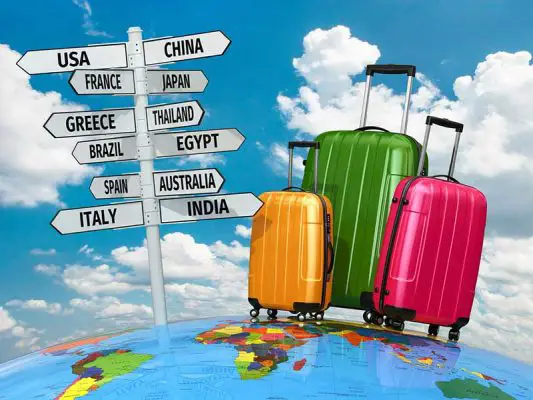
ESL holiday and travel-themed activities
Let’s get into everything you need to know for an ESL holiday lesson. Keep on reading!
ESL Travel and Holiday Activities
Here are the top ESL travel activities that you may want to try out with your students.
#1: Plan a Trip
Have your students plan a dream vacation in English! Instead of researching in their first language, use Google in English. In order to practice writing, keep notes only in English. Here’s an example of how you might plan your trip using English. You can have your students add as little, or as much detail as you’d like. However, the point of the activity is to practice writing in point form which is useful when writing outlines for tests or essays.
Day 1: Monday, January 1
Fly Seoul (3pm) —-> Vancouver (7am) Check in Hotel ABC, 123 Avenue Rest, relax
Day 2: Tuesday, January 2
Stay Hotel ABC Tour Stanley Park Eat Pub XYZ dinner
Day 3: Wednesday, January 3
Check out Hotel ABC Rent car Budget 123 Drive Whistler Rent skis shop ABC Go Skiing Lunch ski lodge Check in Hotel ABC Whistler Bed early
Procedure for one of my favourite ESL travel activities:
- Give students time to do some Internet research about a place they want to go. It’s helpful to specify the number of days. I generally make a rule that they must do this research in English. Suggest some helpful websites where they might like to start (Trip Advisor, Air BnB, etc.).
- Students can make a day-by-day itinerary of what they’re trip is going to look like.
- They can share about their trip with the class or turn it in for a graded assignment.
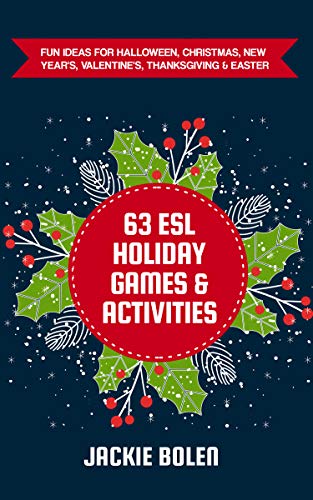
- Amazon Kindle Edition
- Bolen, Jackie (Author)
- English (Publication Language)
- 78 Pages - 03/22/2021 (Publication Date)
#2: A-Z Alphabet Game
If you know that your students already know a fair bit about holiday and travel, you may want to try this quick warm-up game. Or, you could consider using it as a review game at the end of a class.
The way it works is that students, in pairs or small groups write down the alphabet on a piece of paper. Then, they have to think of one travel related word for each letter. It doesn’t have to be done in order. For example:
P: Passport
The winner is the team with the most completed letters at the end of the allotted time. Do you want to find out more? Check this out: A-Z Alphabet Game ESL .
#3: Travel Word Association
This is nice ESL activity to do if you know that your students have studied about travel and holidays before. They can shout out vocabulary words related to this and you can make a mind map or sorts on the board. Group similar things together. For example, articles of clothing.
Find out more about this quick ESL warmer right here: ESL Vocabulary Word Association.

- 146 Pages - 06/18/2020 (Publication Date)
#4: Postcards ESOL Travel Activity
If you can get your hands on some cheap postcards or have some laying around your house or teacher’s office, try out this fun writing activity. It may just be the novelty factor, but students seem to love it. This activity is ideal for working on common greetings, the past tense (more ideas here: ESL past tense games ), and using descriptive words, as well as using synonyms to avoid repetition.
Distribute the postcards to the students. You can do one per student, or put the students into pairs. They have to look at the picture on the front of the postcard and imagine that they went on this vacation. Then, they can write about their trip to a friend or family member.
Next, the students trade postcards with another student or group. After reading them, they can write a response back of at least a few sentences. Finally, you may want to display them around the class as they’re colourful and fun and other students may enjoy reading them! Have some fun with this ESOL travel activity.
- Give each student or pair a postcard. They look at the picture and imagine what they did on that vacation, and then pretend that they’re writing to a friend or family member.
- Exchange postcards and another student or group have to write a response to what they read.
- Display the postcards around your classroom (optional).
#5: Travel or Holiday Videos
I’m ALL about using videos with my ESL/EFL students. They’re fun, engaging and a nice way to grab student’s attention and introduce a topic. Of course, you can base an entire class around one too if you design the activities well.
If you want to find out more about using them in your classes and some activities and games to do with them, you’ll want to check this out: Using Videos for Teaching English .
#6: Dictogloss ESOL Travel Activity
This is a challenging activity that works on listening and writing skills. Find a short story related to holiday or travel. It could even be a description of your own vacation that you took recently.
Then, you read out the story to your students in a way that is a bit challenging for them to catch every word. Students have to take notes and then try to reconstruct what they heard based on their notes in small groups. You can read it again so that students have a chance to make some additions or corrections. Finally, students compare their version with the original.
Do you want to try it out with your students? You can learn more about one of the best ESL travel activities here: ESL Dictogloss Activity .
#7: Holidays ESL Lesson Plan
It’s easy to plan an ESL lesson about any topic, including holidays. Check out this video for the steps to follow:
#8: Yes/No Questions and Answers
If you think about it, holidays and travel lend themselves to a ton of yes/no questions. For example:
- Did you fly or drive?
- Did you eat some delicious things?
- Was the food good?
- Did you have nice weather?
If you want to see some activities or games to work on these kinds of questions, you’ll want to check this out: Yes/No Activities and Games.

- 279 Pages - 07/12/2020 (Publication Date)
#9: ESL Food Activities and Games
I’m not sure if it’s the same for you, but when I travel, it’s ALL about the food. I want to try all the delicious things where I’m staying! The good news is that I have a ton of fun, interactive games and activities for food. You can easily adapt most of them to focus on holidays.
You can find out more details here: ESL Food Activities.
#10: ESL Surveys
I love to use surveys in my classes because they lend themselves to just about any topic. In the case of travel, they’re ideal for working on the present perfect and simple past together.
For example:
Have you ever travelled to another country?
Where did you go?
If you want to know more about how to design and use surveys in your classes for an ESL travel lesson, then you’ll want to check this out: Surveys for ESL Students.
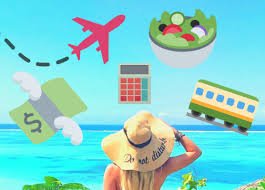
ESL Travel Games and Activities
I also love to use ESL surveys to get students to express an opinion in English.
#11: Present Perfect Activities Related to Travel
The present perfect is often used to talk about vacations, travel and holidays. For example:
- Have you ever been to another country?
- Have you travelled to ______ before?
In order to incorporate this grammatical construction into some of your lesson, you’ll want to check this out: Present Perfect ESL Activities.
#12: Brochure Scanning
This is an excellent travel activity! You’ll have to get your hands on some travel brochures first. The way it works is that students get tons of practice with a reading sub-skill (scanning) because they have to look quickly through the brochures to find specific bits of information. For example, cost or number or days.
Do you want to try out this reading activity? You can find out all the details here: Brochure Scanning Reading Activity for ESL .
#13: Odd One Out ESL Warmer
This is a quick English warm-up activity that you can try out with your students. The way it works is that you write words, in groups of 4 on the board. 3 are similar and 1 is the odd one out. Students have to choose this one and say why it doesn’t fit. For example:
Bathing suit, sunglasses, boots, flip-flops
Answers: Boots because it’s not for a beach vacation. I accept many different answers as long as students support it well.
You can learn more about this ESL warm-up here: Odd One Out for ESL .

- 87 Pages - 10/24/2019 (Publication Date)
#14: Would you Rather?
I’m sure you’ve done this before with friends. You have to choose between two negative things, or two positive things. For example, how you want to die, or what you want to eat. In this case, students could choose between two types of vacation. For example:
Would you rather have a beach or forest vacation?
Would you rather stay in a big hotel, or an AirBNB?
Learn more about this nice activity for an ESL travel lesson here: ESL Would You Rather?

- 110 Pages - 06/22/2021 (Publication Date)
#15: Task Based Activity: Dream Vacation
I love to incorporate this style of teaching into my holiday lessons. It allows students more freedom to choose what they want to learn about and also builds opportunities for some serious teamwork.
In this case, I’ll have students work in groups of 2-3 to plan a dream vacation. They can do some research to find out all the details including how to get there, food, budget, where to stay, etc. Then, they either have to write a report and hand it in to me and/or do a short presentation to the class.
Need some more ideas for this style of a lesson? Check this out: Task-Based Learning .
#16: Travel Themed Charades
I love to play charades with my students. The way it works is that you can think of some travel-related phrases. For example:
- Flying on a plane
- Sleeping on a bus
- Eating noodles
- Buying souvenirs
Then, students have to act this out and their teammates have to guess what the phrase is. More details here: ESL Charades.
#17: Travel Journal
Encourage students to keep a travel journal for a fictional trip. They can describe their experiences, sights, and sounds, using new vocabulary.
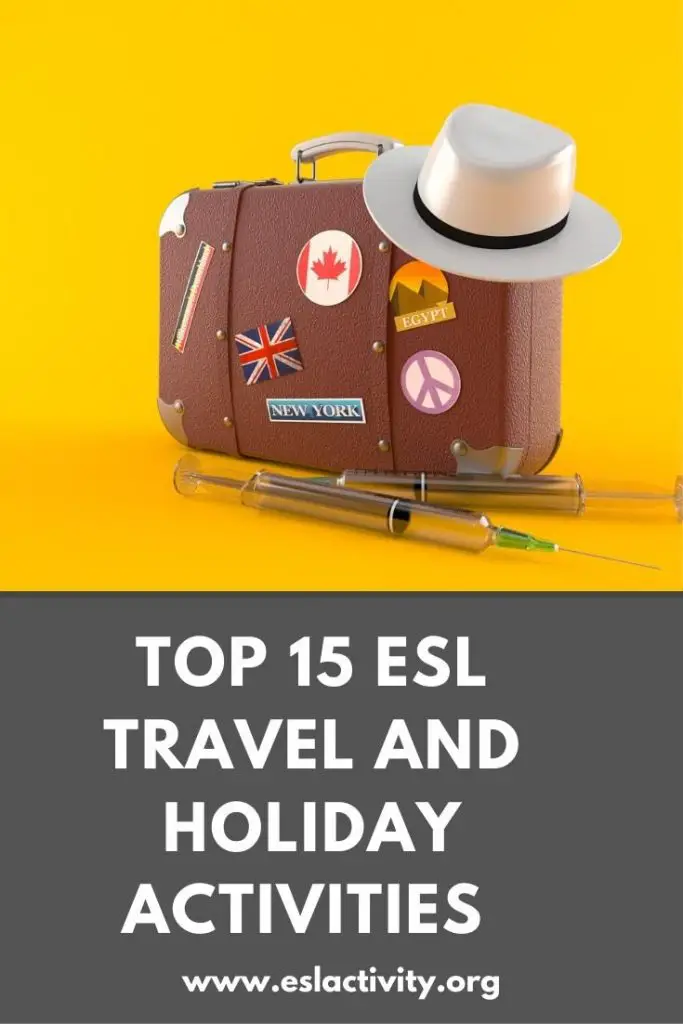
Travel and Holidays ESL
#18: Eliciting in an ESL Travel Lesson
Unless your students are absolute beginners, then it’s likely that they already know a good amount of travel and holiday vocabulary. That’s often why I like to start off my ESL traveling lesson by using some eliciting techniques. There are two main reasons for this.
The first reason is that it’s possible to find out what the students already know about this topic to avoid wasting class time covering these things. The second is that it helps students activate their prior knowledge about travel/holidays to make the new things they learn more memorable. Learn how to do this tactic for an ESL holiday lesson here:
ESL Eliciting Advice .
#19: Travel Listening Lesson
A nice way to talk about any topic is through a listening lesson. In this case, find a conversation between two people talking about an upcoming vacation plan. Or, someone talking about a favourite vacation from the past (it could even be you). Then, design an entire listening lesson around that. Find out how here:
#20: Idiom ESL Traveling Activity
There are lots of idioms related to holidays, travel and transportation. Here are just a few of them:
- All hands on deck
- To send flying
- Bump in the road
- Off the rails
- Train wreck
- Asleep at the wheel
- Fall off the wagon
- Hit the road
One of the best ways to make these idioms super memorable is to do this fun activity. Afterwards, your students will never forget! Learn more about this ESL activity:
Idiom Activity for Language Learners .
#21: Concentration ESL Traveling Vocabulary
One of the best ways to review new words during an ESL holiday or travel lesson is to play this memory game. Depending on the level of the students, make some matching pairs of cards with the following:
- Word/picture
- Word/definition
- Word/clue about the word
Then in small groups, students play the game to find the matches. Find out all the details about how to set it up and play:
ESL Concentration Game .
#22: Speaking Fluency Activity
To use this activity with a unit on holidays or travel, have students talk about a past, or upcoming vacation.
#23: Me Too!
Students have to make a true statement about themselves related to holidays and travelling. For example:
- I’ve been to Japan.
- I hate the beach.
- My family goes on a big vacation every summer.
If other students can agree, they stand up and say, “Me too!”
#24: Labour Day Guessing Game
#25: Holiday Interviews
Pair students and have them interview each other about their favorite holidays. They can then present their partner’s holiday to the class.
#26: Travel Bingo
Create bingo cards with images or words related to travel and holidays. Students mark off the squares as they learn new vocabulary.
#27: Travel-Themed Role-Plays
Set up role-plays where students act as travelers, airport staff, or hotel receptionists. This helps them practice common travel dialogues.
#28: Travel Vocabulary Pictionary
Play Pictionary using travel-related words. Students take turns drawing and guessing the vocabulary words.
#29: Travel Storytelling
Ask students to create and share short stories about a memorable travel experience they’ve had or wish to have in the future.
#30: Travel Debate
Have students debate the pros and cons of traveling. This encourages critical thinking and speaking skills.
Travel and Holiday Vocabulary
Here are some of the most common vocabulary words that you may want to teach your students related to traveling for an ESL holiday lesson.
- bathing suit
- boarding pass
- vaccination
- The months of the year in English
Do you have any ESL travelling vocabulary that you’d like us to add to the list? Leave a comment and let us know!
Travel Worksheets and Lesson Plans for ESL
If you’re looking for some worksheets or lesson plans related to holidays and travel, then you’ll want to check out some of our top resource recommendations:
ESOL Courses
ISL Collective
Lingua House
ESL Travel Vocabulary Worksheets
If you want students to get some practice with ESL travel vocab, here are a few recommendations:
English Club
Did you Like these Travel Games for ESL?
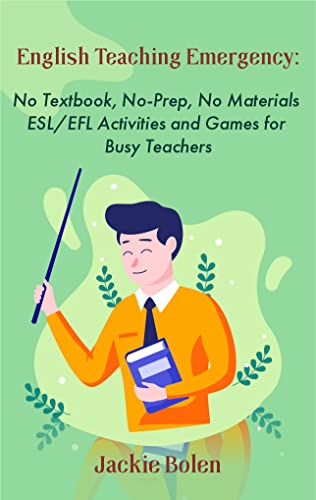
- 68 Pages - 11/12/2019 (Publication Date)
Yes? Thought so. Then you’re going to love this book: The Emergency English Teacher: No-Textbook, No-Prep, No-Materials ESL Activities.
If you’re always in need of last-minute activities and games for your classes, then this book is exactly what you might need. It’s English teaching made easy in a serious way.
You can get the book in digital or print formats. Take the e-version with you to your favourite coffee shop for lesson planning on the go. Or, keep a copy on the bookshelf in your office to use as a handy reference guide. But the best idea is to have it with you at all times for those English teaching emergencies.
Do you want to find out more? Head on over to Amazon to pick up your copy today:

FAQs about ESL Travel Lessons
There are a number of common questions that people have about teaching this unit. Here are the answers to some of the most popular ones.
What is the purpose of teaching the travel and holiday unit to English learners?
The purpose is to help English learners develop vocabulary, grammar, and conversational skills related to travel and holidays.
What topics can be covered within the travel and holiday unit?
Topics can include modes of transportation, booking accommodations, tourist attractions, holiday activities, travel phrases, and cultural aspects of different destinations.
How can I introduce vocabulary related to travel and holidays?
You can introduce vocabulary through visual aids, realia (actual objects), flashcards, and interactive activities such as matching games or vocabulary quizzes.
What grammar structures can be taught in the travel and holiday unit?
Grammar structures such as present simple for schedules and timetables, past simple for recounting travel experiences, future tenses for making travel plans, and modal verbs for expressing preferences or asking for permission can be taught.
What speaking activities can be used to practice travel and holiday-related topics?
Role-plays, group discussions about dream destinations, travel itineraries, or describing holiday experiences are effective speaking activities. Additionally, pair work activities like “Find Someone Who” or “Guess the Destination” can engage learners in conversation.
ESL Travel Activities and Games: Join the Conversation
What are your thoughts about these Holiday ESL activities? Do you have another one that you’d like to recommend to us? Leave a comment below and let us know what you think. We’d love to hear from you.
Also be sure to give this article a share on Facebook, Pinterest, or Twitter. It’ll help other busy English teachers, like yourself find this useful resource for ESOL travel lessons.
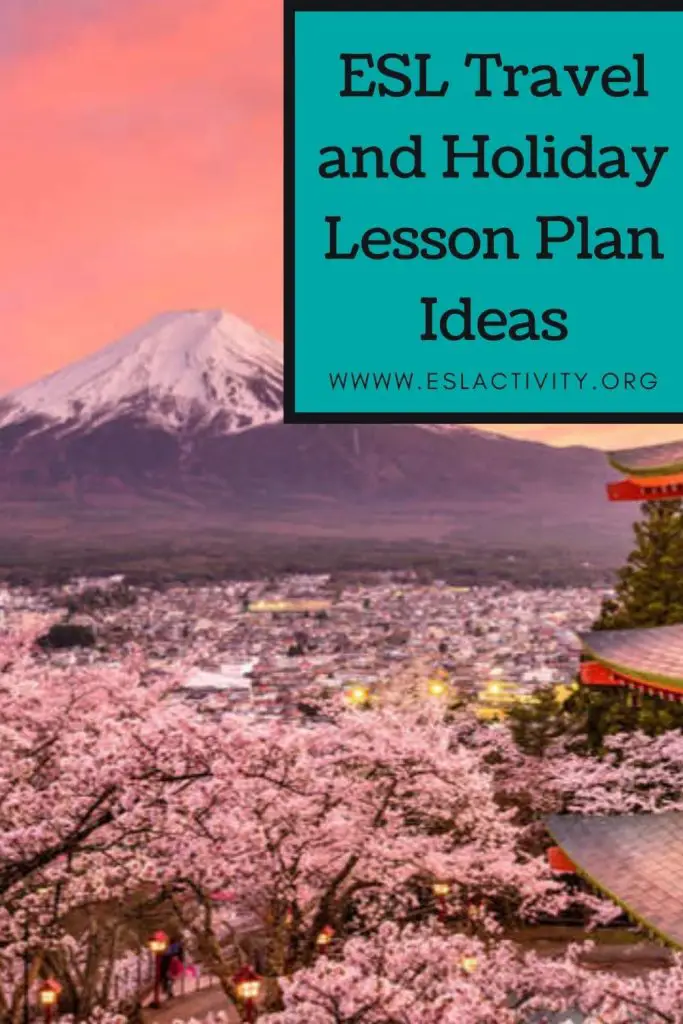
ESL Travel Lesson
Last update on 2022-07-17 / Affiliate links / Images from Amazon Product Advertising API
About Jackie
Jackie Bolen has been teaching English for more than 15 years to students in South Korea and Canada. She's taught all ages, levels and kinds of TEFL classes. She holds an MA degree, along with the Celta and Delta English teaching certifications.
Jackie is the author of more than 60 books for English teachers and English learners, including Business English Vocabulary Builder and 39 No-Prep/Low-Prep ESL Speaking Activities for Teenagers and Adults . She loves to share her ESL games, activities, teaching tips, and more with other teachers throughout the world.
You can find her on social media at: YouTube Facebook Pinterest TikTok LinkedIn Instagram
Top Selling ESL Activity Book

As an Amazon Associate, I earn from qualifying purchases.
More ESL Activities and Games

20 Valentine’s Day Phrases and Idioms | Romantic English Expressions

How Have You Been: Meaning and How to Reply in English

English Conversation Activities for Adults | Fun ESL Conversation Ideas

Math Vocabulary Words in English | Mathematical Words List
About, contact, privacy policy.
Best-selling author and English teacher Jackie Bolen has been talking ESL activities and games since 2015. The goal is to bring you the best ideas, lesson plans, and activity recommendations for your TEFL classes.
Get in touch: About + Contact
Privacy Policy and Terms of Use
Email: [email protected]
Address: 2436 Kelly Ave, Port Coquitlam, Canada

Topic: Travelling

Are you ready to go?
With this lesson, students discuss travel preparation, watch a video about tips on packing and talk about potential challenges when travelling. You can also do a vocabulary activity to revise vocabulary related to the topic.

It’s such a lovely place! (so and such)
With this lesson, students talk about travel experiences, watch a short video about the capital city of Ghana and practise ‘so’ and ‘such’ structures. They also share their personal experiences and discuss the advantages of different travel options.

Hotel reviews
Engage students in conversations about different types of places to stay and their experiences! With this lesson, students practise vocabulary related to accommodation, watch videos and write hotel reviews.

My home is your home
Check out this lesson to have an engaging conversation about home exchange and house sitting and help your students learn useful vocabulary to describe experiences.

Please have your boarding pass ready
Students learn airport and plane phrases, listen to announcements and watch a video with a song. They also talk, role-play and exchange ideas.

Business trips: fun or boring?
This lesson allows students to talk about business trips, learn some useful vocabulary, and have a lot of discussion and role-play.
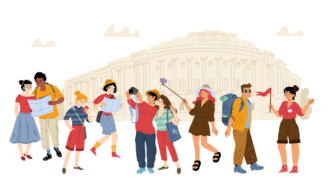
Downsides of tourism
This speaking lesson focuses on talking about tourism and its problems. Students talk about travelling in general and tourism as an industry, watch a video and discuss solutions to the problems.

The intangible benefits of travelling
In this lesson students talk about the article they read at home, learn some vocabulary and talk about different ways of travelling and their benefits.

Food culture, coffee culture
In this ESL lesson about coffee and food culture students have a lot of discussion, watch a video, study nouns that can be both countable and uncountable, and have a lot of fun practice.

Living abroad
In this ESL lesson about living abroad, students watch a testimonial video about learning Portuguese in Brazil, learn some useful collocations and talk about living in different countries.
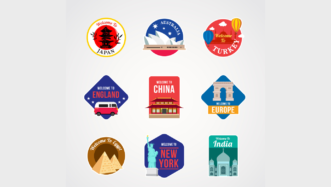
Nation branding and St. Patrick’s Day
In this lesson about St. Patrick’s Day, students watch a video about the origins of the holiday. They also discuss nation branding and practise vocabulary for talking about abstract ideas.

Are you into flying?
This worksheet focuses on speaking about air travel. Students answer different questions, watch and discuss a video. They also read and discuss short stories and create their own.

Would you like a lava snack?
With this tourism lesson plan, students discuss gastro-tourism, watch a video and learn vocabulary related to food.
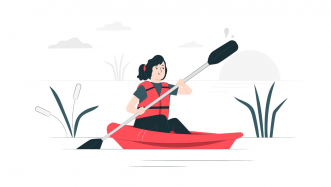
Life is better outdoors!
In this lesson, students watch a video about Taiwan and practise vocabulary related to nature and free time activities.
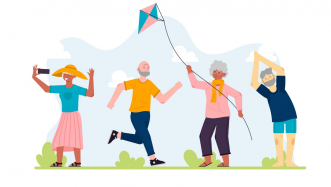
You’re never too old for great things
In this lesson, students learn the differences between Present Perfect and Past Simple. They also practise using the two tenses, watch a video and talk about active lives of elderly people.

Visiting the art capital
This lesson plan is all about New York. Students will discuss some quotes about New York, watch a video about art in this city and learn adjectives to describe art.
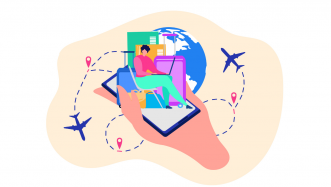
Travel is the only thing you buy that makes you richer
With this travel worksheet, pre-intermediate students can talk about how travelling changes them and learn some useful vocabulary. They also read a short text, watch a video about dream travel destinations and write an email.

Let’s go hiking!
In this lesson students learn hiking vocabulary, read some tips, watch a video about hiking and decide what they would and wouldn’t take on a hike.
Subscribe to get premium content
Subscribe to get access to professional, ready-to-use lesson plans in both digital and printable formats . Discover a variety of lesson types: Standard Lessons, Speaking Classes, Critical Reading Club worksheets and Flipped Classroom lesson plans.
Username or Email Address
Remember Me

Travel ESL Lesson Plans
- A2 Pre-Intermediate
- B1 Intermediate
- B2 Upper Intermediate
- C1 Advanced
- C2 Proficiency
Lesson times:
- 30 min
- 45 min
- 60 min
- 75 min
- 90 min
Lesson types:
- Free
- Premium
ESL Travel Lesson Plans
If you are looking for an ESL lesson plan on transportation and travel, look no more. You’re in the right place.

The seven summits
This lesson plan is created for students at the Upper-Intermediate level,…

Why we travel
This Upper Intermediate lesson plan focuses on expanding travel vocabulary and…

Check out Vienna!
This A2 ESL lesson plan aims to enhance students’ understanding of…

How safe is flying?
This C1 lesson plan focuses on expanding aviation vocabulary …

The geography of small talk
In this Intermediate lesson plan, students will engage in discussions about the nuances…

Chillin’ in Svalbard
In this Upper-Intermediate lesson plan, students will learn about must vs. have to. They will…

If you’re going to San Francisco…
In this Advanced ESL lesson, the students will learn about the culture of…
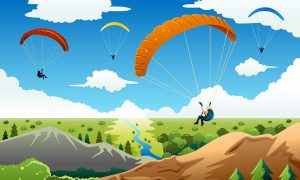
Paragliding to work
In this Intermediate lesson plan, students will talk about the most popular ways…

Exactly where are we now?
In this C2 lesson plan, students will practice vocabulary about travel and international borders. They…

Subscribe to premium content
Here you can find ESL lesson plans on transportation and travel for all difficulty levels, both free and premium.

Our offer – Travel English
We are offering ESL lesson plans for you to use during lessons with your students. Lessons are currently available at A2 and B1 levels , B2, C1 and C2. The duration of each lesson is between 30 and 90 minutes, depending on the plan you choose . This means that you can choose a lesson that suits your students’ level as well as your desired lesson length. The plans are designed to make your job as easy as possible and your teaching as effective as possible. Tired of “forcing” your students to speak? Try our lessons, they guarantee all kinds of discussions between students on topics they actually enjoy, since everyone travels sometimes.
Learn travel vocabulary
Our lesson plans focus on travelling, which gives your students a chance to learn language skills that they will most likely use in their lives. This can also make the lessons interesting – the students can share their experiences with travelling, stories about their travels, share their views on different countries, different cultures and various tourist attractions that they have seen. Lessons include current events, such as traveling during the pandemic, all kinds of situations that may occur at the airport, types of luggage you may bring and much more.
Lessons consist of content that should provoke discussion and prevent students from answering with a simple “yes” or “no”. This will help increase student confidence and also make the teacher’s job easier.
What else to expect
All our ESL Travel lesson plans comprise reading comprehensions, entertaining and inspirational videos, grammar rules and exercises, as well as various forms of discussion related to the topic.
Each week you can expect a new lesson to become available.
Currently we have lessons on travel related topics, such as:
- travelling abroad,
- travelling by planes,
- types of luggage,
- different types of travels and vacations,
- tourist attraction and different tourist destinations,
- life-on-the-road experience.
Our lessons in a few words
You can browse through our lessons to find the ones that suit your needs best. There is an overview for each lesson, so you know exactly what kind of vocabulary you will be teaching and what methods you will use.
Lessons include warm up discussions, videos for your students to watch, reading sections and grammar exercises. All of these elements add up to a complete lesson plan that will ensure your students go home with valuable new skills.
Field Trips for the ESL Class

The idea of going outside and leaving the classroom fills most ESL students with excitement.
Especially if they are bored teenagers that are stuck in class day after day and yearning to get out into the fresh air. Same for young children who find it difficult to sit still for longer than ten minutes.
Even adult students like it. They want to be in the environment and learn English in a real-life situation.
We are talking about field trips.
No doubt you had these when you were at school and maybe at college too. I can remember going to a farm, some museums, the cinema… Just the actual thought of leaving the school and not having to stare at a blackboard all day was enough to get me racing out the door.
We could have been going to look at traffic all day and I would be just as excited.
But for ESL students, going on a field trip can be a very useful part of the learning process. There are many choices for you as the teacher to offer your class.
Let’s take a look at what you can do.
Table of Contents
Where to Go?
If you are teaching younger students, then you could go to a place where you can combine a learning activity and letting the kids have some fun outside the class.
Obvious choices would be a park, a zoo or a museum. In all of these places, younger students can learn some useful words related to the activities but at the same time, they can enjoy themselves too.
For teenagers and older students, you can go to the same places plus a shopping mall or an activity that involves being in nature.
And for adults, you need to offer them something that will be useful to them in their professional life. In the past, I have taken adult students to a bar — this could be useful for them as a bar may be a setting for them to discuss business with potential clients or just as a place to go and unwind after work with colleagues. You could also take them to a restaurant for the same reasons.
Where you choose to go really depend on who your students are, what they are learning and their age.
If your students are mostly sixteen and studying for the IELTS speaking test it would be a waste of time taking them to a fast-food restaurant and practising nouns and verbs used in this environment.
Use your common sense and you can’t go wrong.
Set Some Ground Rules First
Before venturing outside, you need to establish some ground rules.
This is especially true for younger students but you should make rules for any class before going on a field trip. Going outside with your students can demand a whole new set of skills in terms of managing them so make sure they are aware of the boundaries.
You could do this as part of a lesson before going on the field trip.
If you are in a big city or even a smaller town, you should have plenty of museums to choose from. Just go online and you should easily find museums you can visit as part of your field trip.

Why go to a museum?
For young children and teenagers, going to a museum can be a great day out. Museums are well aware that teachers organise field trips for their students and as such, they cater to these groups. If you call ahead you may find that there are other activities open to a group of students that may not be available to the general public.
Science museums are always popular — you may be able to combine a field trip visit with the science teacher. The students are then learning about science in their own language and in English.
But there are also natural history museums and many other places that are perfect for young kids and teenagers.
Many museums today have interactive exhibits to enable students to really come to grips with what they are looking at. This is something you can definitely use to your advantage.
Adult students may also enjoy a trip to the museum — but you should make sure that it is something useful in their day to day life.
Museums also offer books, posters and other goodies that may be very useful to you in the classroom.
A Zoo or Aquarium
Cities always have at least one zoo and an aquarium. These places, like museums, are perfect for field trips. What younger student does not like animals?
You may be able to combine a field trip with the science teacher. In the students’ science class, their teacher may organise a field trip to the city zoo. If so, it might be a good idea to join forces with them and make it part of your English class too.
You can prepare a trip to the zoo or aquarium by having a lesson on animal nouns. Then as the students are running around the zoo screaming their heads off, hopefully, they are also using the English words for lions, tigers and bears.
Like museums, zoos love to receive field trips from schools. As such, they cater to these groups. A phone call ahead may help you greatly.
This should be a very simple field trip to organise as there should be a local park or garden near to the school.

The only real issue with using this as a field trip is that if you are teaching very young students they may think this is just playtime. With this in mind, you really need to prepare carefully outlined activities that they can follow.
And another thing you have to consider is the weather. I once saw a teacher leading his students to the park for an Easter egg hunt. Great idea — except that the day he chose to do it was the day that it poured down with rain.
No one can control the weather but it is something you need to think about. Make sure you have a backup plan.
I have taken small groups of business students to the park for some classes. It just makes a nice change to be outside on a nice day. As long as your students are keen to go, then why not?
A Coffee Shop
I have used coffee shops many a time for English classes. Usually for one-on-one classes and usually with professionals looking to improve their English for work.

Sometimes needs must and due to lack of space anywhere else, a coffee shop can be the ideal location for a one-on-one class.
But what about a field trip?
For young kids, absolutely no.
What would they gain out of it? What interest would they have in going to a coffee shop?
None at all.
But for older students, it could be ideal. If you have been teaching lessons on food and drink and eating out then going to a coffee shop could be a good place to have a lesson.
If I were you, I would choose a privately-owned coffee shop and not a chain. Avoid all those big company coffee shops if you can.
Here is why.
If you choose a privately-owned place you may be able to set up a good deal with the owner. If you speak to the owner beforehand and set up a time when you will go there with all your students, they might give you a group deal on coffee and any food that you order.
Also, if you go at a time when the place is not packed with customers you might be able to use the coffee shop as a kind of classroom.
You could have role plays on ordering food, serving the customers and taking orders.
You could do this in the classroom easily but if you do it in the coffee shop you are then in the right environment and it makes it more fun — and a whole lot easier — for the students.
The coffee shop could also be used by small groups of business students, a more relaxed place to have in-depth discussions on finance or marketing.
I think the key thing here is to find the right location.
But it can be a great place for you and your students.
A Shopping Mall
If you are going to visit a shopping mall with your students, the first thing you need to do is make sure exactly what the purpose is — and establish very strong ground rules.
The last thing you want is to arrive at the mall and all your students disappear and go window shopping.
Or maybe you do, in which case it is fine.

But going to a shopping mall is the perfect place if you are teaching students lessons about shopping, clothes and buying consumer items.
It is a good idea to create a very strong lesson plan before going. Otherwise, it could just descend into you and the students wandering around the mall and chatting.
For example, you could get all the students to take pictures using their smartphones of clothes that you have talked about in a previous lesson. Then back in class, the students can do presentations and show the different clothes they have seen in the mall.
You could also do classes on the different kinds of shops in the mall. And then later the students do presentations about this.
The important thing to remember is to prepare well. Or the students will arrive at the mall and treat it as a day off.
A Toy Store
This could be great. Or it could be really terrible!
You have to establish very clear rules before going or you could have a lot of trouble on your hands. Turning up to a large toy store with a class full of screaming kids could end up in disaster. And the store management demanding payment for damaged goods.
I have never done this personally but I did know of a teacher who took his students to a huge toy store in the city. They said it was fine but they went with a teaching assistant and they had established all the ground rules before going.
And of course, this would not work with adult students. Unless they worked in retail or sales or something related to the environment.
An Art Gallery
Not for young kids. More suitable for older teens and adults.
Although some art galleries have set days for younger students — talk to the gallery before going. Some art galleries run workshops. In which case, this could be the perfect setting to have a class with younger students.

But most art galleries are for showing paintings and artwork in an environment not suited for children.
If you are doing lessons on art or creativity, this could be the perfect place to do it.
It can also be a great place to take students and get them to describe what they are looking at. If there is an exhibition of paintings of realistic representations of people and landscapes this could be perfect. But if the paintings are abstract this could get much more difficult.
I went to an art gallery with some students and I just asked them to describe what they could see in the paintings. The art gallery made it a more sociable location for describing people and things. This is more appealing than just staring at pictures and describing people and objects.
Make sure you are going to an art gallery that is showing artwork you can use in your lesson. If it is too abstract then it becomes very difficult.
A Local Landmark or Tourist Attraction
Every city has its own famous landmarks or tourist attractions. Even a smaller town has one or two of these.
You can use this very effectively as part of a lesson plan.
For example, most cities have a very famous shopping street. You could go there with a lesson plan or an objective in mind and then report all the findings back in class.
The students could then do presentations on what they found and saw on the shopping street.
Obviously, this would not work well with younger students as they may get lost or you lose control of them. But for older teenage students it could work very well.
Also for working adults, this could be part of a lesson plan on sales, retail or even architecture.
Quite often a field trip like this could just be going to the place and doing presentations later in class. The students can take pictures and do a show and tell in front of the others.
A Walk in Nature
If you are fortunate enough to live near some natural setting, this can be great.
A visit to a beach or a hilltop can be a great day out for you and the students.

Prepare a lesson that the students can use while going for a walk in nature and this can work very well for you. The lesson could be about nature, the environment, the arguments about global warming or about activities and things people do at the beach, in the countryside, in the woods, on a hill…
A field trip in nature is a great choice for younger students who just love to run around outside. But also good for teenagers and adults too.
A Sports Game or Event
This is a great idea for a field trip for teenagers and adults.
Make sure you choose an event that most of the students can enjoy. If football is the most popular game in the country you are in, then choose a football game. But it could equally be basketball, cricket or ice-hockey.
You could have a lesson or two before about sport. You could give your students a class on going to a sports game and all the vocabulary based on the stadium or wherever the event is held.
Then you could ask your students to do presentations on the game using photographs and any of the language they learned before.
This can be a great day out for some classes. But use your initiative. If you are teaching certain groups of students they may have no interest in sport. If you are teaching a group of teenage boys they would probably love it though.
An Old People’s Home
I know what you are thinking…
An old people’s home? What could my students possibly learn there?
But if you prepare this class well it could be fantastic.
You could teach the students a class on caring for people and facilities for looking after the elderly.

Some schools run programs on taking care of old people. They often have special days of the year where the students have to do activities to help old people in their community.
If you are teaching at such a school, then you could incorporate a class into this program.
If your students are upper-intermediate or advanced, you could get them to do an English class for the old people in the care home. Often the management of these places is looking for people to run workshops or do activities for the elderly.
We should not imagine that the elderly are just sitting in armchairs staring at the TV. Many of them are very active. They want to do things just as we want to do things.
What better activity than to teach them some basic English skills?
Good for the old people in the home and good for your students too.
Adult Field Trips
The next two ideas are for adults only. Adult students often want to do things that suit their interests and lifestyles.
You can incorporate these into teaching them English.
I have two choices here — going to a bar and eating in a restaurant. I am sure there are other places you can take your adult students but I will leave that to your discretion.
Going to a Bar
Many adults around the world like to go to a bar and unwind after a busy day. Many adult ESL students conduct business meetings with potential clients in a bar. This is very common in many parts of the world so some students — especially business students — may wish to learn how to say certain things in English in a bar setting.

I have had classes in a one-on-one class in a bar. Who would not like to be paid to sit in a bar and drink a nice cold beer?
But please remember you are still teaching your students, so there has to be a purpose for being in the bar.
Maybe going over bar and alcohol vocabulary and phrases beforehand is a good idea.
Eating Out in a Restaurant
Going to a restaurant with students is a very popular out of school activity.
Obviously not with younger students.
But certainly, with adult students, this can be a great way for them to speak English in a social setting. But also a good way to practice English in terms of food, eating out and restaurants.
I have been asked many times to join the students after class — or to just replace the class if it is in the evening — and have dinner with them.
The students are more relaxed, the teacher is treated as the guest of honour and everyone can speak English as if they are just a group of friends out for the night.
What NOT to do on an English field trip
I think it probably goes without saying that there must be a solid reason why you are leaving the class and having a lesson outside.
Do not be that teacher that just rocks up to class and says to all the students: Hey everyone, it’s a really nice day! Let’s all go outside and sit in the park!
Of course, if the students are younger they will not say no. But they are also in your class to learn English or at least improve or practice their English.
Going outside and having a field trip should be of benefit to the students.
Don’t just treat it as a way of not having to do any work for the afternoon.
If done well and if the lesson is prepared well, there is no reason why a field trip should not be an effective part of your ESL class.
As we can see from all the choices above, there are many places to go and you can incorporate these effectively into your English lesson as long as you make a clear lesson plan.
The good thing about teaching ESL is that the students can do all kinds of activities. So by going outside and joining a field trip, you can combine learning English with some really fun things to do.
I hope this is of some help to you.
Please let me know what your thoughts are in the comments below!
Why not join my mailing list? I will send you all my free lesson plans plus I will keep you updated every time I add a new article. You can join right here .
Share this:
- Click to share on Twitter (Opens in new window)
- Click to share on Facebook (Opens in new window)
- Click to share on LinkedIn (Opens in new window)
- Click to share on Reddit (Opens in new window)
- Click to share on Tumblr (Opens in new window)
- Click to share on Pinterest (Opens in new window)
- Click to share on Pocket (Opens in new window)
- Click to share on Telegram (Opens in new window)
- Click to share on WhatsApp (Opens in new window)
Related Posts

How to keep your students interested in your English class

Icebreakers for the first day of English class

How to teach Absolute Beginners in the English Class
2 thoughts on “field trips for the esl class”.
Field trips are awesome, as you say, if good ground rules have been established. They are also far superior ways of teaching/learning than classroom settings. These are some points to consider: 1. English speaking only trip. 2. Pre-trip vocabulary practice and post trip accountability for something learned. 3. I like your idea of combining with another class for multiple purpose learning. 4. I also love the old people’s home visit which can include performances done by your EFL group for the seniors. An orphanage would also be a good choice. 5. Assign students responsibilities in the preparation and carrying out of the trip. This can include a presentation with information about the place you will visit or its history. This presentation can be done by the class rather than for the teacher to spoon feed it to the students.
These are fantastic ideas.
Yes, English only on the trip, I think is essential. And making the students accountable so they have to show or produce something from the trip.
Great suggestions. Many thanks Leona!
Leave a Reply Cancel reply
Conversation Worksheets about Travel
The ESL Worksheets and teacher's notes on this page are in PDF format. You are free to download, print and photocopy them unmodified for classroom use.


- All topics A-Z
- Grammar
- Vocabulary
- Speaking
- Reading
- Listening
- Writing
- Pronunciation
- Virtual Classroom
- Worksheets by season
- 600 Creative Writing Prompts
- Warmers, fillers & ice-breakers
- Coloring pages to print
- Flashcards
- Classroom management worksheets
- Emergency worksheets
- Revision worksheets
- Resources we recommend
- Copyright 2007-2021 пїЅ
- Submit a worksheet
- Mobile version
Conversation Questions Travel

50 fun travel conversation questions
Travel conversation questions.
Free discussion worksheets with pictures to describe the topic of travel. Difficult words on this first printable include – pack, prefer, cruise, destination, thoroughly, gotten, accommodation, backpacking, international, furthest, and distance.
The travel conversation questions on worksheet 1 are –
1 – When was the last time you traveled? Where did you go?
2 – What is your favorite thing about traveling?
3 – Where would you like to travel to next? When do you think you will go there?
4 – How long can you travel before you start to miss home?
5 – What are the most important things to pack before you go traveling?
6 – What kinds of transport do you prefer to travel by?
7 – Are there any places in your country that you never want to travel to? Why not?
8 – Who in your family is the best person to travel with?
9 – Have you ever been on a cruise ship? Would you like to take a cruise?
10 – What kinds of activities do you like to do when you are traveling?
11 – Have you ever learned or tried to speak another language while traveling?
12 – What are the top travel destinations in your country? Have you been to them?
13 – How do you usually decide on a travel destination?
14 – Do you like to plan your travel thoroughly or just make it up as you go along?
15 – What do you think of backpacking? Would you like to try it?
16 – Have you ever gotten lost on your travels? What did you do?
17 – What kind of accommodation do you usually stay in when you take trips?
18 – What is the best way to keep your money safe when you go traveling?
19 – Have you ever felt scared or been in danger on your travels?
20 – How has COVID-19 changed travel in your country and internationally?
21 – Where is it your dream to visit? Do you think you will ever get there?
22 – What is the furthest distance you have ever been from your home?
23 – Do you prefer to travel alone, with friends , or with family?
24 – What is the first thing you do when you arrive in a new city?
25 – Do you use any websites or apps when you travel? What for?
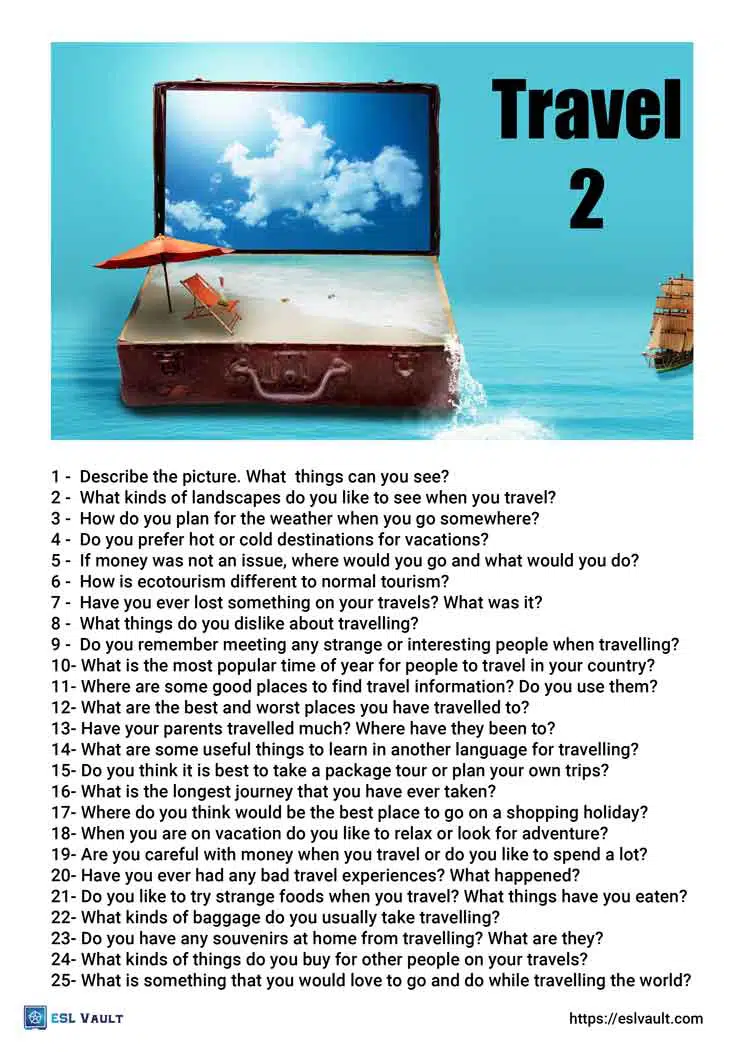
Travel conversation questions 2
Before starting the discussion with this second set of questions, be sure the students are familiar with the terms – landscape, ecotourism, issue (problem), journey, baggage, and souvenir.
On this second worksheet, the travel conversation questions are –
26 – What kinds of landscapes do you like to see when you travel?
27 – How do you plan for the weather when you go somewhere?
28 – Do you prefer hot or cold destinations for vacations?
29 – If money was not an issue, where would you go and what would you do?
30 – How is ecotourism different to normal tourism?
31 – Have you ever lost something on your travels? What was it?
32 – What things do you dislike about traveling?
33 – Do you remember meeting any strange or interesting people when traveling?
34 – What is the most popular time of year for people to travel in your country?
35 – Where are some good places to find travel information? Do you use them?
36 – What are the best and worst places you have traveled to?
37 – Have your parents traveled much? Where have they been?
38 – What are some useful things to learn in another language for traveling?
39 – Do you think it is best to take a package tour or plan your own trips?
40 – What is the longest journey that you have ever taken?
41 – Where do you think would be the best place to go on a shopping holiday?
42 – When you are on vacation do you like to relax or look for adventure?
43 – Are you careful with money when you travel or do you like to spend a lot?
44 – Have you ever had any bad travel experiences? What happened?
45 – Do you like to try strange foods when you travel? What things have you eaten?
46 – What kinds of baggage do you usually take when traveling?
47 – Do you have any souvenirs at home from traveling? What are they?
48 – What kinds of things do you buy for other people on your travels?
49 – What is something that you would love to go and do while traveling the world ?
50 – What is the best photograph that you have taken while traveling? Where were you?
Related activities
For further discussion you may want to use the transport conversation questions or the airport conversation questions . There are also transport and airport activities in the vocabulary worksheets archives.
For talking about weather and cities around the world there is also the weather pair work speaking activity.
You might also like these
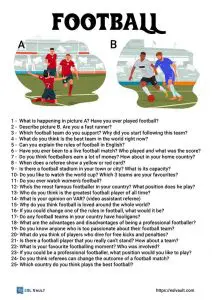
25 football conversation questions
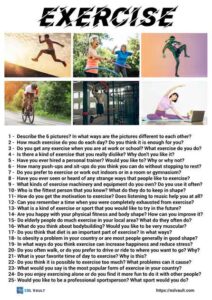
25 exercise conversation questions

25 happiness conversation questions
Free ESL and English teaching resources, no sign up required. Just find what you like, download it and head to class!
Privacy Policy
Share ESL Vault with your friends!
- Writing Worksheets
- Vocabulary Worksheets
- Pronunciation
- Kids worksheets
- Idioms and Expressions
- ESL Puzzles
- ESL Pair Work Activities
- ESL Conversation Questions
- Coloring Pages
- Articles, Lists and Ideas
- Art and Craft Activities
Travel Vocabulary for English-Language Learners
With a follow-up quiz for extra practice
- Basic Conversations for English Language Learners
- Pronunciation & Conversation
- Writing Skills
- Reading Comprehension
- Business English
- Resources for Teachers
- TESOL Diploma, Trinity College London
- M.A., Music Performance, Cologne University of Music
- B.A., Vocal Performance, Eastman School of Music
The travel-related words below are the most important terms to know when talking about travel or taking vacations . Words are categorized into different sections depending on the type of travel. You'll find example sentences for each word to help provide context for learning, as well as a short quiz at the end to test your knowledge.
Air Travel Vocabulary and Sample Sentences
Airport : I went to the airport to catch a flight to San Francisco. Check in : Make sure to get to the airport two hours early to check in. Fly : I like to fly on the same airline to get mileage points. Land : The airplane will land in two hours. Landing : The landing took place during a storm. It was very scary! Plane : The plane is packed with 300 passengers. Take off : The airplane is scheduled to take off at 3:30 p.m.
Vacation Travel Vocabulary and Sample Sentences
Camp : Do you like to camp in the woods? Destination : What is your final destination? Excursion : I'd like to take an excursion to the wine country while we're in Tuscany. Go camping : Let's go to the beach and go camping next weekend. Go sightseeing : Did you go sightseeing while you were in France? Hostel : Staying in a youth hostel is a great way to save money on vacation. Hotel : I'll book a hotel for two nights. Journey : The journey will take four weeks and we'll visit four countries. Luggage : Can you carry the luggage upstairs? Motel : We stayed in a convenient motel on our way to Chicago. Package holiday : I prefer to buy package holidays , so I don't have to worry about anything. Passenger : The passenger felt ill during the voyage. Route : Our route will take us through Germany and on to Poland. Sightseeing : The sightseeing in this town is rather boring. Let's go shopping . Suitcase : Let me unpack my suitcase and then we can go swimming. Tour : Peter went on a tour of the vineyard. Tourism : Tourism is becoming an important industry in almost every country. Tourist : Every May, many tourists from around the world come to see the flower festival. Travel : Travel is one of his favorite free time activities. Travel agent : The travel agent found us a great deal. Trip : The trip to New York was lovely and interesting. Vacation : I'd love to take a nice long vacation on the beach.
Overland Travel Vocabulary and Sample Sentences
Bicycle : One of the best ways to see the countryside is to ride a bicycle. Bike : We rode a bike from shop to shop. Bus : You can catch a bus for Seattle at the bus station. Bus station : The bus station is three blocks from here. Car : You might want to rent a car when you go on vacation. Lane : Make sure to get into the left lane when you want to pass. Motorcycle : Riding a motorcycle can be fun and exciting, but it's also dangerous. Freeway : We'll have to take the freeway to Los Angeles. Highway : The highway between the two cities is quite lovely. Rail : Have you ever traveled by rail? Go by rail : Going by rail offers the opportunity to get up and walk around as you travel. Railway : The railway station is down this street. Road: There are three roads to Denver. Main road : Take the main road into town and turn left at 5th Street. Taxi : I got in a taxi and went to the train station. Traffic : There's a lot of traffic today on the road! Train : I like riding on trains. It's a very relaxing way to travel. Tube : You can take the tube in London. Underground : You can take the underground in many cities throughout Europe. Subway : You can take the subway in New York.
Sea / Ocean Travel Vocabulary and Sample Sentences
Boat: Have you ever piloted a boat? Cruise: We will stop at three destinations during our cruise through the Mediterranean. Cruise ship: It's the most elegant cruise ship in the world! Ferry: Ferries allow passengers to take their cars with them to their destination. Ocean: The Atlantic Ocean takes four days to cross. Port: There are all kinds of commercial ships in the port. Sailboat: The sailboat requires nothing but the wind. Sea: The sea is very calm today. Set sail: We set sail for the exotic island. Ship: Have you ever been a passenger on a ship? Voyage: The voyage to the Bahamas took three days.
Travel Vocabulary Quiz
Test your knowledge by taking this short quiz.
- destination
- your mindset
- conversation
- have a beer
- all answers are correct
- all the answers are correct
- Family-Related Vocabulary for English-Language Learners
- Vocabulary Quiz - Travel
- Reporting Verbs for English Language Learners
- Sports Vocabulary for English Learners
- Travel Vocabulary
- Hobbies Vocabulary for English Students
- Media Vocabulary for English Learners
- Education Vocabulary for English Learners
- Spanish Vocabulary for Planes and Airports
- Indirect Speech in the English Language
- Dating and Marriage Vocabulary in English
- Vocabulary Lesson: French for Travelers
- Advertising Vocabulary for English Learners
- German for Travelers: The Basic Travel Phrasebook
- How Do You Rate as an Expert of the English Language?
- Driver Education Key Vocabulary for English Learners

In this beginner-level ESL lesson, you will learn grammar, vocabulary, and phrases to talk about everyday English topics: an English conversation lesson to talk about and describe a place and experience while traveling.
This ESL lesson also comes with a downloadable PDF you can access when you are a member of Pocket Passport.
This ESL video lesson for daily English will help ESL students learn vocabulary, grammar, improve listening and be confident English speakers.
Practical English for everyday situations. When talking about travel, it’s important to know how to Give Directions in English and talk about a future or past trip and Sightseeing .

Warm Up Questions
What places interest you in Europe? Why?
Do you like to travel to busy cities or quiet places?
Do you like the beach? Swimming, suntanning, jet skiing, etc.?
Do you like Spanish food? How about French, Italian, German?
Do you take lots of photos when you travel?
Do you buy lots of souvenirs when you travel?

Watch the following ESL YouTube video lesson on travel.
Listening questions, watch the esl youtube video on travel and answer the following questions ..

What time did they arrive this morning?
Were they able to relax on the plane?
What is the best way to get around Barcelona?
Why is walking the best way to get around?
How are the beaches in Barcelona?
What else is good to see in Barcelona?
What did they have for lunch?
How will she share her memories with her mom?
Speaking Activity
Use the illustrations to talk about the passage and travel..

arrive | beach | beautiful | building | check into city | comfortable | interesting | photo | place | plane real | seat | see | send | sleep | soon | get around
Match the words on the left with the meanings on the right ..

Sentence Structure
Put the following sentences in the correct order ..

- way / around / because / walk / is / Barcelona / great / best / the / to / get / is / to / weather / The / !
- Barcelona / one / of / beaches / the / world / the / to / best / places / has / of / and / interesting / buildings / and / in / lots / see / old / .
- our / took / beautiful / buildings / around / the / of / into / photos / some / checked / and / we / city / hotel / the / After / we / walked / . / ,
- lunch / some / to / Spanish / food / great / had / a / For / went / and / restaurant / we / great / . / ,
- Spanish / some / was / to / interesting / real / try / food / It / .
- lots / I’m / soon / so / photos / some / taking / you / send / of / I’ll / , / !
Missing Words
Watch the video again and complete the sentences..

We are in Barcelona! We _______________ 1 at about 7 am this morning. We had very comfortable seats on the plane, so we _____________ 2 some good sleep before we arrived. Barcelona is a ________________ 3 city. The best way to get around Barcelona is to walk because the weather is great! Barcelona has one of the best ________________ 4 in the world and lots of interesting buildings and old places to see. After we __________________ 5 our hotel, we walked around the city and took some photos of the beautiful _____________ 6 . For lunch, we went to a great restaurant and had some great ________________ 7 food. It was interesting to try some real Spanish food. I’m taking lots of _______________ 8 , so I’ll send you some soon!
Love, Natasha
Are You a Teacher?
Get access to over 500 lessons.
- Audio Files
- Downloadable PDF’s
- Digital Quizzes & Flashcards
- Grammar Tools
- Gamification Tools
- Add Student Accounts
- Create & Sell Courses
Are You a Student?
Improve your….
- Vocabulary & Idioms

- Privacy Policy
- Terms and Conditions
Customer Care is here to help!
Copyright 2022 Procketpassport.com.
All Right reserved.
- Full Access to Select Lessons
- New Lessons Added Every Week
- Free Lessons Include:
- PowerPoints
- Everything in Free +
- Full Access to ALL Lessons
- Lesson & Course Builder
- Easily Create Sales Pages
- Sell Courses Online
- Upload Your Own Content
- Student Accounts
- Premium Teacher & Student Tools
- Online Reservation System
- Feedback & Evaluation Tools
- Full Admin Tools
- Full Customization
- & Lots More!
Enter your email address below where you would like us to send the free sample!
Your privacy is protected..

Your Free Sample will arrive shortly. Have a great day!
Improve your English. Speak with confidence!
- Free Mini Course

- Posted in in ESL Conversation Questions
70 travel conversation questions to practice your English
- Posted by by Cameron Smith
- January 27, 2023
- Updated April 20, 2023
Use this list of travel conversation questions to help your students practice their English speaking skills.
Almost everyone has a strong opinion or two on travel. Whether they love to travel by plane, train, or automobile or prefer to avoid travel altogether, these fun travel questions should spark some lively conversations in your classroom!
Travel conversation questions
- Where is the most interesting place you have ever visited?
- What activities do you like to do when you travel?
- Do you prefer to travel alone or with others?
- Have you ever traveled abroad?
- In your opinion, what is the ideal length of a vacation or trip abroad?
- What has been your most memorable travel experience?
- What are the benefits of traveling?
- What is the best way to save money while traveling?
- What type of transportation do you use when traveling?
- How often do you go on holiday trips?
- Do you ever travel for business? Would you like to?
- Have you ever gone on a long distance trip?
- How has travelling changed your life?
- What is the most exotic place you have ever visited?
- What do you think are the essential items to bring when traveling?
- What do you like most about traveling?
- What do you like least about traveling?
- When you travel, do you prefer to relax or seek out new adventures?
- Do you prefer traveling to cities or the countryside?
- Would you prefer to travel to a beach or the mountains?
- Do you prefer to plan your trips ahead of time or be spontaneous?
- Are you planning any trips right now? If so, where will you be going?
- What is one destination that everyone should see in their lifetime?
- What’s the best place for people to visit in your home country?
- What tips would you give someone who is traveling for the first time?
- How has technology changed the way we travel today?
- What challenges have you faced while traveling abroad?
- How has traveling abroad changed you?
- Are there any places that are still on your travel bucket list?
- What are the top 3 destinations on your travel bucket list?
- How do you like to prepare for your vacations?
- What is the most important thing you have learned while travelling?
- How do you make sure to stay safe while traveling?
- Are there any destinations that are too dangerous to visit? Why?
- Are there any places that should be off-limits to tourists?
- Have you ever encountered language barriers while travelling?
- How do you usually find accommodations when travelling?
- What kind of food have you tried while travelling abroad?
- Do you prefer to travel domestically or internationally?
- What is the most important thing to consider when planning a trip?
- What are your best tips for packing for a trip?
- Are you an “overpacker” or an “underpacker”?
- What tips can you give for packing light when travelling?
- What destination do you think is underrated and why?
- How has travelling helped you develop new skills?
- Have you ever gone on an adventure trip or safari?
- What tips do you have for staying healthy while traveling?
- Have you ever experienced culture shock?
- Are there any particular customs that surprised you while traveling abroad?
- How have your travels impacted your career choices and goals?
- What kind of souvenirs do you like to bring back from your trips?
- Are there any particular souvenirs that remind you of your travels?
- What are some of the biggest challenges of traveling solo?
- What are some of the advantages of traveling solo?
- Do you enjoy traveling with your family?
- Do you enjoy traveling with a big group of friends?
- Do you enjoy traveling with small children?
- When you travel, do you prefer to stay in hotels or Airbnbs?
- What unique activities have you done on vacation?
- Are there any places that have particularly stood out during your travels?
- Do you prefer guided tours or independent exploration when traveling to a new place?
- What tips can you give for budgeting while traveling overseas?
- How did the pandemic impact your future travel plans and goals?
- Have any of your travels inspired you in some way? How?
- Are there any places that have made a lasting impression on you during your travels?
- How do you make sure to respect local cultures and traditions when traveling abroad?
- Do you like to connect and chat with locals when you travel? If yes, how do you make it happen?
- What have you learned from other cultures during your travels?
- Has travel changed your perspective on different cultures and people? How?
- Has travel changed how people interact with each other across different cultures and countries? If so, how?
Are there any other ESL Discussion Topics and ESL conversation questions that you’d you like us to write about?
Let us know in the comments!
Get free English lessons via email
Subscribe to my newsletter and get English lessons & helpful resources once a week!
Unsubscribe anytime. For more details, review our Privacy Policy .
I agree to receive updates & promotions.
You have successfully joined our subscriber list.
Cameron Smith
I'm an English Communication Coach based in Vancouver, Canada. I'm on a mission to help millions of people speak English with confidence. Thanks for visiting this site! If you want longer video content, please follow me on YouTube for fun English lessons and helpful learning resources!
Post navigation

30 ESL conversation questions about soccer and football

- Posted in in Grammar
Why does English have so many homophones?
- January 29, 2023

TRAVEL ENGLISH/ENGLISH FOR TOURISTS
Learn/practice common english phrases used by travelers.


Conversation Questions
600 Best ESL Travel Conversation Questions
A H M Ohidujjaman

Learning to talk about travel and describe experiences in English is important for ESL students. It helps them handle different travel situations, make travel plans , use public transportation , communicate with locals, and share their adventures.
Using conversation questions in the classroom is an effective way to improve students’ ability to participate in real-life conversations.
While teaching travel conversations, ESL teachers can use these conversation questions to help students practice talking about travel. These questions are great for students to learn new words and build confidence.
This post has 600 questions in 10 categories for all skill levels, from beginners to Proficient (A1 to C2) learners. With questions sorted by difficulty, teachers can easily find the right ones for their students.
Using these questions in classroom speaking activities like discussions, role-plays, or pair work makes learning fun and helps students improve their real-life conversation skills.
By practicing with these questions, students will get better at talking about travel in English, helping them communicate well in different cultures. This resource is a great tool for ESL classrooms focusing on travel conversations.
Table of Contents
Destinations: 60 travel conversation questions.
Beginner (A1)
- Have you ever visited another country?
- What is your favorite place to go in your city?
- Do you like beaches or mountains more?
- Have you ever been on a plane?
- What country would you like to visit next?
- Do you prefer hot or cold destinations?
- What is the capital city of your country?
- Can you name three famous landmarks?
- What’s the most beautiful place you’ve seen in pictures?
- Would you like to travel more in the future?
Elementary (A2)
- How do you usually plan your trips?
- Have you ever traveled alone?
- What kind of attractions do you enjoy visiting?
- Do you prefer rural or urban destinations?
- What’s the best vacation you’ve ever had?
- What do you think is the most popular tourist destination in the world?
- How do you choose your travel destinations?
- Have you ever visited a UNESCO World Heritage Site?
- What activities do you like to do when you travel?
- Would you rather stay in a hotel or a hostel?
Pre-Intermediate (B1)
- How do you think traveling has changed in the last decade?
- What factors do you consider when planning a trip?
- Do you prefer guided tours or exploring on your own?
- How important is it for you to try local food when you travel?
- What’s the most adventurous thing you’ve done while traveling?
- How do you adapt to different cultures when you travel?
- Have you ever experienced culture shock while traveling?
- What do you think are the benefits of traveling?
- How do you deal with language barriers when you travel?
- Do you think technology has made traveling easier or more complicated?
Intermediate (B2)
- How has travel impacted your view of the world?
- Do you think sustainable tourism is important? Why or why not?
- Have you ever experienced a travel mishap? What happened?
- How do you think social media has influenced travel trends?
- What’s the most challenging aspect of traveling for you?
- Have you ever traveled to a place where you didn’t speak the language at all?
- Do you prefer short trips or longer vacations? Why?
- What’s your opinion on voluntourism?
- How do you think virtual reality will impact the future of travel?
- Would you consider living abroad for an extended period of time?
Upper-Intermediate (C1)
- How do you think the tourism industry will change in the future?
- Have you ever experienced reverse culture shock after returning home from a trip?
- What’s your favorite off-the-beaten-path destination?
- How do you think Brexit will affect travel within Europe?
- Have you ever participated in a homestay program? What was it like?
- What’s the most underrated travel destination you’ve been to?
- How do you think artificial intelligence will influence travel in the future?
- What role do you think space tourism will play in the future of travel?
- Have you ever traveled to a place that exceeded your expectations?
- How do you think the pandemic will permanently change the way we travel?
Advanced (C2)
- How do you think global events like climate change will impact travel in the future?
- Have you ever experienced ethical dilemmas while traveling?
- What’s the most memorable interaction you’ve had with a local while traveling?
- How do you think geopolitical tensions affect tourism?
- Have you ever traveled to a place that challenged your worldview?
- What’s your opinion on the rise of digital nomadism?
- How do you think travel will be different for future generations?
- Have you ever participated in ecotourism? What was your experience like?
- What do you think are the biggest misconceptions people have about travel?
- How do you think the concept of luxury travel will evolve in the future?
Transportation: 60 travel Conversation Questions
- How do you usually get around your city?
- Have you ever ridden a bicycle?
- What’s your favorite mode of transportation?
- Do you know how to use public transportation?
- Have you ever taken a taxi?
- What’s the difference between a bus and a train?
- Have you ever been on a boat?
- Do you know how to ride a scooter?
- Have you ever traveled by car?
- What’s the fastest way to travel long distances?
- What’s the most common form of transportation in your country?
- Have you ever been on a subway or metro?
- Do you prefer traveling by plane or by train?
- Have you ever taken a long-distance bus?
- What’s the difference between a taxi and a ride-sharing service?
- Have you ever traveled by tram or light rail?
- Do you know how to read a map for navigation?
- Have you ever traveled by ferry?
- What’s the most comfortable mode of transportation?
- How do you usually book your transportation tickets?
Intermediate (B1)
- How do you think technology has improved transportation?
- What’s the most efficient mode of transportation for short distances?
- Have you ever experienced delays while traveling? How did you handle it?
- What’s the most environmentally friendly way to travel?
- How do you think autonomous vehicles will change transportation?
- Have you ever traveled by high-speed train?
- What’s your opinion on bike-sharing programs?
- How do you think transportation infrastructure impacts a city’s development?
- Have you ever missed a connecting flight? What did you do?
- What’s the best way to navigate a new city’s transportation system?
- How do you think the sharing economy has impacted transportation?
- Have you ever traveled on a budget airline? What was your experience like?
- What role do you think electric vehicles will play in the future of transportation?
- Have you ever traveled by sleeper train?
- How do you think hyperloop technology will revolutionize transportation?
- What’s your opinion on congestion pricing in cities?
- Have you ever experienced culture shock while using public transportation in a foreign country?
- How do you think transportation systems differ between developed and developing countries?
- What’s the most convenient way to travel between cities in your country?
- How do you think transportation will change in response to climate change?
- What do you think are the ethical implications of space tourism?
- How do you think transportation will adapt to accommodate an aging population?
- Have you ever traveled on a luxury cruise? What was your experience like?
- How do you think transportation systems will evolve in response to population growth?
- What’s your opinion on the future of supersonic travel?
- How do you think transportation networks will be affected by global pandemics in the future?
- Have you ever traveled on a private jet?
- What’s the most efficient way to reduce carbon emissions from transportation?
- How do you think transportation infrastructure will adapt to accommodate renewable energy sources?
- What role do you think government policies play in shaping transportation systems?
- How do you think transportation will be affected by advancements in artificial intelligence?
- Have you ever traveled on a historic or vintage mode of transportation?
- What’s your opinion on the potential for flying cars in urban transportation?
- How do you think transportation will adapt to accommodate growing urban populations?
- Have you ever experienced transportation-related discrimination while traveling?
- What’s your perspective on the future of space exploration and interplanetary transportation?
- How do you think transportation systems will evolve to prioritize accessibility for people with disabilities?
- How do you think transportation infrastructure will be affected by geopolitical shifts?
- What’s your opinion on the future of autonomous drones for delivery and transportation?
- How do you think transportation systems will adapt to address income inequality?
Cultural Experiences: 60 Travel Conversation Questions
- Have you tried any new foods while traveling?
- Do you enjoy listening to music from other countries?
- Have you visited any famous places while traveling?
- Have you been to any festivals or events while traveling?
- Have you seen any traditional dances while traveling?
- Would you like to try wearing clothes from another country?
- Have you watched any shows or performances while traveling?
- Do you like trying different foods from around the world?
- Have you visited any museums while traveling?
- Do you want to learn more about customs in other countries?
- Describe a festival or event you attended while traveling.
- Have you participated in any local customs or rituals while traveling?
- Do you enjoy exploring markets and trying new foods while traveling?
- Describe a performance or show you watched while traveling.
- Have you visited any historical sites or landmarks while traveling?
- Describe a traditional dish you tried and liked while traveling.
- Do you enjoy learning about the history and customs of places you visit?
- Have you ever visited a traditional village or community while traveling?
- Describe a craft or skill you learned while traveling.
- Do you like immersing yourself in the culture of the places you visit?
- How do you show respect for different cultures while traveling?
- Describe a cultural event or festival you attended abroad.
- Discuss how tourism affects traditional cultures in different countries.
- How do you handle cultural differences when traveling?
- Describe a cultural landmark or museum you visited.
- Discuss the importance of language when experiencing other cultures.
- How does food help you understand a culture when traveling?
- Describe a traditional ritual or custom you observed.
- How does technology impact cultural experiences while traveling?
- How does travel change your perspective on other cultures?
- Analyze how globalization influences cultural experiences while traveling.
- Describe a unique cultural experience you had while traveling.
- Discuss the impact of travel on breaking cultural stereotypes.
- How do cultural exchange programs benefit participants?
- Analyze the ethical implications of cultural tourism.
- Discuss the role of social media in sharing cultural experiences.
- How can travelers support cultural preservation efforts?
- Discuss the effects of mass tourism on cultural heritage.
- How do power dynamics affect cultural interactions while traveling?
- Reflect on how travel broadens cultural understanding.
- Analyze the role of cultural diplomacy in international relations through travel.
- Discuss how cultural perceptions shape travel experiences.
- Analyze the complexities of cultural identity in a globalized world.
- How does travel contribute to preserving cultural heritage?
- Discuss the ethics of cultural appropriation in the travel industry.
- Analyze the impact of climate change on cultural sites.
- How do colonial legacies affect cultural interactions while traveling?
- Discuss the responsibility of travelers in promoting cultural understanding.
- How can travel foster empathy and solidarity with marginalized communities?
- Reflect on the potential of travel to challenge cultural hegemony.
- Analyze the intersection of travel, culture, and power dynamics.
- Discuss the role of indigenous knowledge in sustainable tourism.
- Analyze the impact of travel narratives on cultural perceptions.
- How can travelers engage in ethical tourism practices?
- Discuss the role of language in cultural exchange.
- Analyze the effects of globalization on cultural diversity.
- How can travelers promote cultural revitalization efforts?
- Discuss the importance of cultural sensitivity in travel.
- Reflect on the responsibility of travelers in cultural preservation.
- Analyze the potential of travel to promote social justice and equity.
Accommodation: 60 Travel Conversation Questions
- Where do you usually sleep at night?
- Have you ever stayed in a hotel?
- What’s your favorite thing about staying with family or friends?
- Have you ever slept in a tent?
- What’s the most comfortable place to sleep in your house?
- Have you ever stayed in a hostel?
- What’s the difference between a house and an apartment?
- Have you ever slept in a sleeping bag?
- Do you prefer sleeping in a bed or on a couch?
- What’s the quietest place to sleep in your home?
- What type of accommodation do you prefer when traveling?
- Have you ever rented a vacation home or apartment?
- What amenities do you look for in accommodation?
- Have you ever stayed in a cabin?
- What’s the difference between a hotel and a motel?
- Have you ever slept in a dormitory?
- What’s your opinion on staying in an Airbnb?
- Have you ever camped in a campground?
- What do you think is the most important aspect of accommodation?
- Have you ever booked accommodation online?
- How do you choose accommodation when traveling?
- Have you ever had a negative experience with accommodation while traveling?
- What do you think are the benefits of staying in a boutique hotel?
- Have you ever used a homestay accommodation?
- What’s your opinion on all-inclusive resorts?
- Have you ever stayed in a traditional guesthouse?
- What factors do you consider when booking accommodation?
- Have you ever stayed in a bed and breakfast?
- How do you handle accommodation bookings when traveling with a group?
- What’s the most unique accommodation you’ve ever stayed in?
- How do you think technology has changed the accommodation industry?
- Have you ever experienced cultural differences in accommodation standards while traveling?
- What’s your opinion on the rise of eco-friendly accommodations?
- Have you ever stayed in a historic hotel or inn?
- How do you think the sharing economy has impacted the accommodation sector?
- Have you ever stayed in a themed hotel?
- What’s your perspective on luxury accommodations versus budget accommodations?
- Have you ever experienced a homestay with a local family?
- How do you think accommodation preferences vary between generations?
- What role do you think accommodation plays in the overall travel experience?
- How do you think accommodation standards vary between different regions of the world?
- Have you ever participated in a work exchange program where accommodation was provided?
- What’s your perspective on the future of virtual accommodation experiences?
- How do you think accommodation providers can better cater to diverse traveler needs?
- Have you ever stayed in accommodation that was significantly different from what you expected?
- What’s your opinion on the impact of accommodations on local communities and economies?
- How do you think the concept of accommodation will evolve in response to global crises such as pandemics or natural disasters?
- Have you ever stayed in accommodation that was focused on wellness or mindfulness?
- How do you think accommodation trends will change in response to shifting travel preferences?
- What’s your perspective on the importance of sustainable accommodation practices?
- How do you think accommodation preferences reflect broader societal trends?
- Have you ever stayed in accommodation that provided unique cultural immersion experiences?
- What’s your opinion on the role of accommodation in promoting social equality and inclusivity in travel?
- How do you think advancements in architecture and design will influence the future of accommodation?
- Have you ever stayed in accommodation that was designed for remote work or digital nomadism?
- What’s your perspective on the role of government regulation in the accommodation industry?
- How do you think accommodation providers can address issues of accessibility and inclusivity for travelers with disabilities?
- Have you ever stayed in accommodation that integrated sustainable and regenerative design principles?
- What’s your opinion on the concept of accommodation as a form of cultural exchange and education?
- How do you think accommodation preferences will evolve in response to changing societal values and priorities?
Travel Tips: 60 Travel Conversation Questions
- What do you pack in your suitcase when you travel?
- Have you ever forgotten to pack something important?
- What’s the best way to avoid getting lost while traveling?
- Have you ever lost your passport or ID while traveling?
- What’s the most important thing to remember when traveling?
- Have you ever had trouble communicating in another language while traveling?
- What’s the best way to stay safe while traveling?
- Have you ever missed a flight or train?
- What’s the first thing you do when you arrive in a new place?
- What’s your favorite travel memory?
- How do you stay organized while traveling?
- Have you ever experienced jet lag? How do you cope with it?
- What’s the best way to manage your money while traveling?
- Have you ever had trouble finding accommodation while traveling?
- What’s the most useful travel gadget you own?
- Have you ever tried local transportation while traveling?
- What’s the best way to meet new people while traveling?
- Have you ever gotten sick while traveling? How did you handle it?
- What’s your favorite travel destination and why?
- How do you find good places to eat while traveling?
- How do you plan your travel itinerary?
- Have you ever experienced culture shock while traveling? How did you deal with it?
- What’s the best way to stay connected with friends and family while traveling?
- Have you ever traveled with a group? What are the pros and cons?
- What’s your strategy for finding affordable flights?
- Have you ever experienced a travel scam? How did you handle it?
- What’s your advice for overcoming language barriers while traveling?
- Have you ever tried street food while traveling? What was your experience like?
- What’s your approach to haggling in markets while traveling?
- How do you balance planning and spontaneity while traveling?
- How do you prioritize attractions and activities when planning your travels?
- Have you ever experienced homesickness while traveling? How did you cope?
- What’s your strategy for packing light while still being prepared for different situations?
- Have you ever traveled solo? What are the benefits and challenges?
- What’s your advice for staying healthy and fit while traveling?
- Have you ever had a memorable interaction with a local while traveling?
- What’s your approach to managing travel stress and anxiety?
- Have you ever had to deal with lost luggage? How did you handle it?
- What’s your opinion on travel insurance? Is it necessary?
- How do you navigate cultural differences in etiquette and customs while traveling?
- How do you think technology has changed the way we travel?
- Have you ever experienced burnout from traveling too much? How did you address it?
- What’s your perspective on slow travel versus fast travel?
- Have you ever taken a sabbatical or extended leave to travel? What did you learn from the experience?
- What’s your advice for traveling sustainably and responsibly?
- Have you ever participated in a cultural exchange or immersion program while traveling?
- How do you think the rise of digital nomadism will impact the future of work and travel?
- What’s your approach to managing travel finances and budgeting effectively?
- Have you ever had to navigate a travel emergency or crisis situation? How did you handle it?
- How do you think travel habits and preferences will change post-pandemic?
- How do you think artificial intelligence and big data will shape the future of travel planning and experiences?
- Have you ever engaged in volunteer or service-based travel? What was your experience like?
- What’s your perspective on the concept of transformative travel?
- How do you think geopolitical shifts and global crises will impact the future of travel?
- Have you ever participated in a travel writing or blogging project? What insights did you gain?
- What’s your opinion on the ethical considerations of travel, such as overtourism and cultural preservation?
- How do you think emerging technologies like virtual reality and augmented reality will enhance the travel experience?
- What’s your approach to responsible and respectful tourism when visiting culturally sensitive destinations?
- Have you ever had a travel experience that challenged your preconceptions or changed your worldview?
- How do you envision the future of travel in terms of sustainability, accessibility, and inclusivity?
Food and Dining :60 Travel Conversation Questions
- What is your favorite type of food to eat when traveling?
- Have you ever eaten at a local restaurant while traveling?
- Do you like trying street food from different countries?
- What foods do you usually pack for a trip?
- Have you ever cooked a meal while on vacation?
- Do you prefer eating out or cooking while traveling?
- What is the strangest food you’ve tried while traveling?
- Have you ever taken a food tour in a new city?
- What food do you miss the most from home when traveling?
- Describe a memorable meal you had while traveling.
- Have you ever tried cooking a traditional dish from another country?
- Do you enjoy trying new fruits or vegetables when traveling?
- Describe a restaurant you would recommend to a friend visiting your favorite travel destination.
- How do you order food in a restaurant when you don’t speak the language?
- Have you ever had a picnic while traveling?
- Describe a local specialty you tried and liked while traveling.
- Do you like trying different desserts from around the world?
- Have you ever participated in a cooking class while traveling?
- Describe a food market or food festival you visited while traveling.
- How does food reflect the culture of a country?
- Discuss the importance of trying local cuisine when traveling.
- Have you ever had a meal with a local family while traveling?
- How do you adapt to dietary restrictions or food allergies when traveling?
- Describe a food-related tradition you observed while traveling.
- How do food trends differ between countries?
- Discuss the role of food in social gatherings and celebrations while traveling.
- Have you ever tried a food that you didn’t like while traveling? What was it?
- How do you discover new restaurants or eateries while traveling?
- Discuss the influence of globalization on food culture in different countries.
- Analyze the impact of tourism on local cuisine and dining traditions.
- How does food tourism contribute to the economy of a destination?
- Describe a memorable dining experience you had while traveling.
- Discuss the role of food bloggers and influencers in shaping culinary tourism.
- How does food sustainability play a role in your dining choices while traveling?
- Analyze the differences between fine dining and street food experiences while traveling.
- Discuss the importance of authenticity in food experiences while traveling.
- Have you ever tried to recreate a dish you had while traveling at home?
- How do cultural norms around food etiquette vary across different countries?
- Analyze the cultural significance of sharing meals in different societies.
- Discuss the intersection of food, identity, and globalization in the culinary world.
- Analyze the role of food in promoting cultural exchange and understanding.
- Describe a traditional cooking technique or ingredient you discovered while traveling.
- How do food festivals and events contribute to destination branding and tourism?
- Analyze the cultural appropriation of food in the global restaurant industry.
- Discuss the ethics of food tourism and its impact on local communities.
- How does food play a role in preserving cultural heritage and traditions?
- Analyze the relationship between food security and tourism development.
- Discuss the impact of social media on food tourism experiences.
- How can travelers support sustainable and ethical dining practices while traveling?
- Analyze the power dynamics within the global food industry and its impact on local economies.
- Discuss the cultural significance of food rituals and ceremonies in different societies.
- Analyze the representation of food culture in literature, film, and media.
- How can culinary diplomacy promote cross-cultural understanding and cooperation?
- Discuss the role of indigenous knowledge and traditional food systems in sustainable development.
- Analyze the impact of food tourism on cultural authenticity and preservation.
- How do food justice and equity issues intersect with tourism and travel?
- Discuss the potential of gastronomy tourism to support rural development and revitalization.
- Analyze the relationship between food, memory, and nostalgia in travel experiences.
- How can travelers engage in responsible gastronomic tourism to support local communities and traditions?
Activities and Entertainment: 60 Travel Conversation Questions
- What do you like to do for fun?
- Have you ever played a sport?
- Do you enjoy watching movies or TV shows?
- What’s your favorite game to play?
- Have you ever visited a park or playground?
- Do you like to listen to music?
- Have you ever danced?
- What’s your favorite book?
- Do you enjoy going to parties or celebrations?
- Have you ever visited a zoo or aquarium?
- Can you describe a game you enjoy playing with friends?
- Have you ever been to a sports event or match?
- What’s your favorite movie genre?
- Do you have a favorite outdoor activity?
- Have you ever attended a concert or live performance?
- What’s your favorite type of music to listen to?
- Have you ever learned to play a musical instrument?
- Can you recommend a book you’ve read recently?
- Do you have a favorite holiday or festival?
- Have you ever been to a museum or art exhibition?
- How do you like to stay active and fit?
- Have you ever participated in a team sport or club?
- What’s the last movie you watched? Did you enjoy it?
- Do you have a hobby or pastime you’re passionate about?
- Have you ever attended a theater performance or musical?
- What’s your favorite genre of music, and why?
- Have you ever taken dance lessons or joined a dance group?
- Can you recommend a book that had a big impact on you?
- How do you like to celebrate special occasions or milestones?
- Have you ever traveled to attend an event or festival?
- How do you balance work and leisure activities in your life?
- Have you ever competed in a sports competition or tournament?
- What’s your opinion on binge-watching TV series?
- How do you unwind and relax after a busy day?
- Have you ever performed in a play or musical production?
- How does music influence your mood and productivity?
- Have you explored different dance styles or cultural dance traditions?
- Can you recommend a book that challenged your perspective on a topic?
- How do you like to spend your weekends or free time?
- Have you ever volunteered at a community event or festival?
- How do you incorporate mindfulness and self-care practices into your leisure time?
- Have you ever coached or mentored others in a sports or recreational activity?
- What’s your take on the impact of streaming services on traditional media consumption?
- How do you see the role of the arts in promoting social change and activism?
- Have you ever organized or curated an arts or cultural event?
- What’s your perspective on the influence of music on cultural identity and expression?
- How do you engage with dance as a form of personal expression or communication?
- Can you recommend a book that influenced your personal or professional growth?
- How do you balance between solitary and social leisure activities?
- Have you ever attended a workshop or seminar related to your hobbies or interests?
- How do you cultivate a sense of balance between work, leisure, and personal development?
- Have you ever initiated or led a community project related to recreation or entertainment?
- What’s your vision for the future of entertainment and leisure in a digital age?
- How do you advocate for inclusivity and diversity in cultural and recreational spaces?
- Have you ever collaborated with artists or performers on a creative project?
- What role do you see leisure activities playing in promoting mental health and well-being?
- How do you engage with dance as a form of cultural diplomacy or expression?
- Can you recommend a book that reshaped your worldview or philosophical outlook?
- How do you integrate leisure and cultural experiences into your lifelong learning journey?
- Have you ever organized or participated in a leisure or entertainment-focused retreat or conference?
Language and Communication: 60 Travel Conversation Questions
- How do you say “hello” and “thank you” in the local language when traveling?
- Have you ever used gestures to communicate when you didn’t speak the language?
- What basic phrases do you learn before traveling to a new country?
- Have you ever used a translation app while traveling?
- How do you ask for directions in a foreign language?
- Do you know how to order food in a restaurant in another language?
- Have you ever learned numbers in another language to help with shopping?
- How do you greet people when meeting them for the first time in another country?
- Do you know how to ask for help in an emergency situation in another language?
- Have you ever tried to learn a few words in the local language before traveling?
- Describe a time when language barriers made communication difficult while traveling.
- How do you introduce yourself in another language when meeting new people?
- Have you ever taken a language course before traveling to a new country?
- What phrases do you use to order food and drinks in a restaurant?
- How do you ask for information or assistance at a hotel in another language?
- Describe a time when you used a map or sign language to communicate while traveling.
- Have you ever used a phrasebook to help with communication in another language?
- How do you say “excuse me” or “sorry” in the local language when needed?
- Describe a situation where knowing a few words in the local language helped you while traveling.
- How do you express gratitude in another language when someone helps you?
- Discuss the importance of learning the local language when traveling to a new country.
- How do you navigate cultural differences in communication styles when traveling?
- Describe a time when you used language apps or online resources to communicate while traveling.
- How do you handle misunderstandings or miscommunications in a foreign language?
- Discuss the role of body language and facial expressions in cross-cultural communication.
- Describe a situation where you used language skills to negotiate prices or deals while traveling.
- How do you adapt your language and communication style when interacting with locals?
- Discuss the challenges of learning a new alphabet or script when traveling to a country with a different writing system.
- Describe a time when you practiced speaking with locals to improve your language skills while traveling.
- How do you ask for recommendations or advice from locals in another language?
- Analyze the benefits of language immersion programs for improving language skills while traveling.
- How do you overcome language barriers in professional or business settings while traveling?
- Discuss the role of cultural competence in effective cross-cultural communication.
- Describe a situation where you used language skills to resolve a conflict or misunderstanding while traveling.
- How do you practice active listening when communicating in a foreign language?
- Analyze the impact of technology on language learning and communication while traveling.
- Discuss the importance of cultural sensitivity when using humor or sarcasm in another language.
- Describe a situation where you used language skills to connect with locals on a deeper level while traveling.
- How do you maintain and improve your language skills while traveling long-term?
- Analyze the differences between formal and informal language usage in another culture.
- Analyze the influence of globalization on language diversity and language endangerment.
- Discuss the role of language policy and planning in promoting multilingualism and language rights.
- Describe a situation where you acted as a language interpreter or translator while traveling.
- How do you navigate language variations and dialects within a single country while traveling?
- Analyze the role of English as a lingua franca in international communication and travel.
- Discuss the impact of colonialism on language spread and dominance in different regions.
- How do you address language barriers and accessibility issues in travel and tourism?
- Analyze the effectiveness of language exchange programs for improving language skills while traveling.
- Discuss the role of technology in facilitating language learning and communication for travelers.
- Analyze the ethical considerations of language learning and communication in diverse cultural contexts.
- Analyze the intersection of language, identity, and power dynamics in global communication.
- Discuss the impact of language revitalization efforts on cultural preservation and heritage.
- Analyze the role of language ideologies in shaping perceptions and attitudes towards different languages.
- How do linguistic landscapes reflect cultural diversity and linguistic rights in travel destinations?
- Discuss the ethical implications of language dominance and linguistic imperialism in travel and tourism.
- Analyze the impact of language education policies on promoting intercultural understanding and communication.
- How do multilingual individuals navigate language hierarchies and linguistic discrimination while traveling?
- Discuss the role of translation and interpretation in facilitating cross-cultural communication and understanding.
- Analyze the potential of language learning apps and online platforms for promoting language diversity in travel.
- How can travelers advocate for linguistic justice and inclusive language policies in travel and tourism?
Budget Travel: 60 Travel Conversation Questions
- Have you ever traveled to a nearby town or city?
- How do you usually travel: by bus, train, or car?
- What’s the cheapest way to travel in your area?
- Have you ever packed a lunch for a day trip?
- Where’s the cheapest place you’ve stayed overnight?
- Do you know any inexpensive activities to do in your town?
- Have you ever gone on a hike or nature walk?
- How do you save money on transportation?
- What’s the best way to find affordable food when traveling?
- Have you ever used public transportation in another city?
- Can you share tips for finding cheap accommodation?
- How do you plan a budget-friendly day out?
- Have you ever traveled by budget airline?
- What’s your favorite budget travel destination?
- How do you save money on sightseeing and attractions?
- Can you recommend any budget-friendly restaurants or street food vendors?
- What’s the best way to save money on souvenirs?
- Have you ever stayed in a hostel or guesthouse?
- How do you budget for unexpected expenses while traveling?
- Can you share your experience with camping or backpacking?
- How do you research and plan budget travel itineraries?
- Have you ever used travel rewards or loyalty programs to save money?
- What are your favorite budget travel hacks or tips?
- How do you budget for transportation costs when traveling abroad?
- Can you recommend any budget-friendly travel destinations off the beaten path?
- How do you avoid overspending while dining out during your travels?
- What’s your experience with Couchsurfing or homestays?
- How do you find affordable transportation options within a city?
- Have you ever volunteered or worked abroad to fund your travels?
- How do you manage your finances while traveling long-term on a budget?
- How do you prioritize your spending when planning a budget trip?
- Can you share your experience with budget travel apps or websites?
- What’s your approach to finding cheap flights and accommodation deals?
- How do you negotiate prices while shopping or bargaining abroad?
- Can you recommend any budget-friendly outdoor activities or adventures?
- How do you handle emergencies or unexpected expenses while traveling on a budget?
- Have you ever traveled using alternative accommodation options like house sitting or volunteering?
- How do you balance saving money with experiencing local culture and attractions?
- Can you share your experience with long-term budget travel or backpacking trips?
- How do you maintain a budget while splurging on occasional treats or experiences during your travels?
- How do you assess the overall cost of a destination before planning your trip?
- Can you share your strategies for maximizing value while minimizing expenses during travel?
- What’s your opinion on ethical considerations when traveling on a budget?
- How do you plan and budget for multi-destination trips or long-term travel?
- Can you discuss the pros and cons of different budget accommodation options?
- How do you handle currency exchange and banking fees while traveling internationally?
- What’s your approach to finding and enjoying budget-friendly cultural experiences and festivals?
- How do you maintain a healthy balance between budget constraints and travel aspirations?
- Can you share your experience with sustainable and eco-friendly budget travel practices?
- How do you leverage social connections and local networks to enhance your budget travel experiences?
- How do you evaluate the socio-economic impact of budget tourism on local communities?
- Can you discuss the role of technology and innovation in shaping budget travel trends?
- What’s your perspective on the ethics of budget travel in relation to environmental sustainability?
- How do you navigate the complexities of budget travel insurance and risk management?
- Can you share your insights into the future of budget travel in a rapidly changing world?
- How do you advocate for responsible and inclusive tourism practices within the budget travel industry?
- What strategies do you employ to support local businesses and artisans while traveling on a budget?
- How do you address the challenges of accessibility and inclusivity in budget travel experiences?
- Can you discuss your experience with participatory budgeting and community-based tourism initiatives?
- How do you envision promoting cultural exchange and understanding through budget travel endeavors?
Souvenirs and Shopping: 60 Travel Conversation Questions
- Have you ever bought a souvenir from a trip?
- What kinds of souvenirs do you like to bring back from vacations?
- Have you visited any markets or shops while traveling?
- Do you collect postcards from the places you visit?
- How do you choose souvenirs to buy?
- Have you ever bought a keychain as a souvenir?
- What is your favorite souvenir from a trip?
- Do you like to buy gifts for friends and family when you travel?
- Have you ever purchased a magnet from a tourist attraction?
- How do you budget for souvenirs when traveling?
- Describe a memorable souvenir you bought while traveling.
- Have you ever haggled for a souvenir at a market?
- Do you prefer buying souvenirs from local shops or tourist stalls?
- How do you decide what souvenirs to buy for friends and family?
- Have you ever bought traditional clothing as a souvenir?
- Describe a souvenir you regret buying.
- Do you keep a travel journal or scrapbook as a souvenir?
- How do you pack souvenirs to bring them home safely?
- Have you ever bought artwork as a souvenir?
- Do you like to buy souvenirs that represent the culture of the place you visited?
- Discuss the significance of souvenirs in preserving travel memories.
- How do you negotiate prices when buying souvenirs at markets?
- Describe a souvenir you received as a gift from a friend who traveled.
- How do you avoid buying fake or mass-produced souvenirs?
- Discuss the environmental impact of souvenir shopping while traveling.
- Describe a souvenir that holds sentimental value for you.
- How do you balance buying souvenirs with staying within your travel budget?
- Discuss the ethical considerations of buying souvenirs made from endangered species or cultural artifacts.
- Describe a souvenir you bought that supports local artisans or communities.
- How do you incorporate souvenirs into your home decor or daily life?
- Analyze the role of souvenirs in shaping perceptions and memories of travel experiences.
- How do you navigate cultural differences in gift-giving customs when buying souvenirs?
- Describe a souvenir that sparked a meaningful conversation with someone back home.
- Discuss the impact of souvenir shopping on local economies and communities.
- How do you research the authenticity and value of souvenirs before purchasing them?
- Analyze the emotional attachment and nostalgia associated with souvenirs from travel.
- Discuss the rise of sustainable and ethical souvenir shopping practices among travelers.
- How do you support local artisans and craftsmen through souvenir purchases?
- Describe a souvenir you bought that reflects your personal travel style or interests.
- Analyze the trends and evolution of souvenir shopping in the age of globalization and mass
- Analyze the commodification of culture in the global souvenir industry.
- Discuss the cultural appropriation of indigenous designs and symbols in souvenir production.
- Describe the impact of souvenir shopping on cultural heritage preservation and authenticity.
- How do souvenir markets and shops contribute to destination branding and tourism promotion?
- Analyze the ethics of souvenir acquisition in relation to cultural heritage protection and repatriation.
- Discuss the role of souvenir collecting as a form of cultural capital and social identity.
- Analyze the intersection of souvenir shopping, consumerism, and sustainable travel practices.
- Discuss the potential of souvenir tourism to foster intercultural exchange and understanding.
- Analyze the representation of destination identity and image through souvenir merchandise.
- How can travelers advocate for responsible and ethical souvenir consumption practices?
- Analyze the role of souvenir shopping in the construction of tourist identities and experiences.
- Discuss the power dynamics and inequalities inherent in souvenir production and consumption.
- Describe the impact of souvenir shopping on local cultural authenticity and commodification.
- Analyze the influence of souvenir markets and shops on urban landscapes and cultural tourism.
- Discuss the role of souvenir narratives and storytelling in shaping travel memories and identities.
- Analyze the impact of globalization on souvenir production, distribution, and consumption patterns.
- Discuss the potential of souvenir tourism as a tool for sustainable community development and empowerment.
- Analyze the relationship between souvenir shopping and cultural heritage preservation initiatives.
- Discuss the ethics of souvenir acquisition in relation to cultural appropriation and exploitation.
- How can travelers promote ethical and sustainable souvenir shopping practices in the tourism industry?
In conclusion, talking about travel in English is a great way for ESL students to practice and improve their language skills.
Using these 600 travel conversation questions, teachers can create engaging and interactive lessons that help students learn new vocabulary, gain confidence, and enhance their real-life conversational abilities.
Whether discussing travel plans, sharing experiences, or role-playing different scenarios, these questions will help students become more proficient in discussing travel topics in English, enabling them to communicate effectively in various cultural settings.
FREE E-Book

Discover more from ESL Info
Subscribe now to keep reading and get access to the full archive.
Type your email…
Continue reading
ESL Lesson Packing A Bag
How to pack for a weekend trip, student level.
Downloads: 176
Video Length: 1:42
Updated on: 06/30/2024
Lesson Time: 1–2 hrs.

Unlocking this lesson costs 1 credit and will give you full access to the printable lesson plan, interactive lesson plan, and teacher's guide. Click here to get credits.
ESL Lesson Packing A Bag Description
Objective & overview.
This ESL lesson plan on packing for a trip provides activities, PDF worksheets, and digital materials designed for beginner A1-A2 students. In this lesson, students will:
- Learn basic items that people pack for trips
- Discuss questions & topics about packing a bag and preparing for a trip
- Watch a video of a woman giving tips on how to pack a bag for a trip
- Learn and use grammar on “Let’s + [base verb]” to suggest ideas when packing and planning a trip
PREVIEW & DISCUSSION
In the first part of this ESL lesson plan on packing a bag, students match items to some images . These items include things we commonly take on short trips, such as an umbrella, wallet, phone charger, clothing, toiletry kit, and other common items.
Then, students proceed to discuss a few questions and topics about packing a bag and preparing for a trip.
The preview section concludes with students matching verbs to some images with descriptions. These images show a man, Max, doing certain activities to prepare for a trip, like doing laundry, checking the weather, booking a hotel, and planning outfits.
VIEWING ACTIVITY
In the viewing phase of the lessons, students watch a video on how to pack a bag for a weekend trip. In the video, a woman shows some items that she packs for a trip, and some ideas on how to pack them properly into a travel bag.
In the first listening activity, students choose the 5 items they see in the video, which are displayed in some images.
The next activity focuses on listing some activities in the correct order according to the video. There is one more exercise for students to answer some short questions. These activities are mostly about how to prepare for a trip (checking the weather, doing laundry, etc.).
DISCUSSION & GRAMMAR
After students watch the video, there are three discussion questions. These questions focus on what students think of the tips, and kinds of trips that people commonly take, such as a beach trip or a city trip.
The next part of the lesson is focused on grammar. Students read a short conversation between two people — Diego and Clara. Diego asks Clara what kind of trip she’d like to go on. Clara responds by saying “Let’s go on a nature walk together!”. Students choose the correct options in a set of rules about the usage of “Let’s + [base verb]” .
In the third part, students continue reading the rest of the dialogue between Diego and Clara. They match some phrases using “Let’s…” into the dialogue, including “Let’s bring…” and “Let’s check…”.
PLAN A TRIP & PACK!
In this communicative task-based activity, students work with a partner or their teacher to plan a trip . First, they decide on the type of trip, such as a beach vacation or a city adventure, and choose specific dates and a destination. They then check the weather forecast and make a list of items to pack , using helpful phrases like "Let's bring..." or "Let's visit...". Students will fill out a trip planner with their destination, travel dates, and a packing list. Finally, they present their travel plans to the class, practicing their speaking skills.
Alternatively, students can select from various scenarios, like a picnic or a business meeting, and suggest items to bring using the phrase "Let's...".
BENEFITS OF USING THIS ESL LESSON ON PACKING FOR A TRIP
Vocabulary Development
Students learn essential travel-related words, including common packing items and trip activities.
Practical Skills
The lesson provides real-life skills for planning and preparing for a trip, making it relevant and engaging.
Grammar Practice
Students practice the “Let’s + [base verb]” structure, improving their ability to suggest ideas and collaborate in English.
Listening Comprehension
Watching the video enhances listening skills, with real-life contexts and practical packing tips.
Interactive Activities
Engaging exercises like matching items to images and planning a trip encourage active participation.
Video Description
Lesson activities.
Packing a Bag, Taking Trips
Images, Sequencing, Short Answers
Items For Packing A Bag
Let's + [base verb]
Plan A Trip & Pack, Quiz & Review, Lesson Reflection
Lesson Topics
Packing A Bag, Traveling, Trips
Lesson Preview
Similar lessons, ready to get this lesson plan.
You can get a lesson credit for $2.99 to download this lesson. We've also got other options for a better value.
Confirm Lesson Download
You can unlock the full lesson materials for How To Pack For A Weekend Trip for 1 credit. Are you sure?

Your download is ready. You can open your lesson from your device or in your browser. Enjoy your lesson!


COMMENTS
ESL Travel and Holiday Activities. Here are the top ESL travel activities that you may want to try out with your students. #1: Plan a Trip. Have your students plan a dream vacation in English! Instead of researching in their first language, use Google in English. In order to practice writing, keep notes only in English.
Preparation is key to a successful field trip. The field trip should tie in with a unit or concept students have been studying in class. This will ensure that they have learned the appropriate English vocabulary and concepts necessary to make meaning from the field trip experience. Teachers should introduce the field trip by stating how the ...
Step-by-step instructions on how to create effective Lesson Plans for fun and engaging ESL field trips with your students. Plus FREE LESSON SAMPLES!
Updated on May 30, 2019. This English lesson plan helps reinforce vocabulary related to traveling by asking students to plan trips and excursions based on the profile of different groups of travelers. It is helpful to use local newspapers, especially newspapers that provide local events, to give students ideas of real places to visit.
Global Issues. This speaking lesson focuses on talking about tourism and its problems. Students talk about travelling in general and tourism as an industry, watch a video and discuss solutions to the problems. Unlimited Plan Show. C1 / Advanced | C2 / Proficiency. Critical Reading Club 30 min / 45 min. Add to saved lessons.
Our offer - Travel English. We are offering ESL lesson plans for you to use during lessons with your students. Lessons are currently available at A2 and B1 levels, B2, C1 and C2. The duration of each lesson is between 30 and 90 minutes, depending on the plan you choose. This means that you can choose a lesson that suits your students' level ...
Teaching ESL. Field Trips for the ESL Class. The idea of going outside and leaving the classroom fills most ESL students with excitement. Especially if they are bored teenagers that are stuck in class day after day and yearning to get out into the fresh air. Same for young children who find it difficult to sit still for longer than ten minutes.
Here are some ideas to use as follow-up exercises in class or as homework to help solidify what students have learned on their short field trips: Create short role-plays based on their experiences. Draw up vocabulary trees employing new vocabulary used/studied during their preparations and short field trip.
ESL Travel Information Role-Play - Speaking Activity: Asking and Answering Questions from Prompts, Communicative Practice - Pair Work - Pre-intermediate (A2) - 25 minutes. In this free travel information role-play activity, students practice conversations between a ticket agent and a customer where they ask and answer questions about travel ...
An ever-popular topic among students of all levels. This lesson focuses on developing fluency through a range of discussion questions, such as "How important is it for young people to visit other countries?" Ready-to-go conversation-based worksheets about travel - for ESL students. With Teachers Notes and answers.
ESL Video offers free and premium resources for teaching and learning English, including online speaking practice with conversational AI, listening comprehension quizzes, lessons and materials, Chattybot Builder and Quiz Builder, and the International Teens Conversation Exchange (ITCE).
Field trips also help by: Giving the students experience on your local public transport system. Providing the chance for several classes to mix, making possible new friendships and cultural connections. Obliging students to use a map of the city, its subway or bus routes, and the building you're visiting; this helps gain familiarity with the ...
625 Travel English ESL worksheets pdf & doc. SORT BY. Most popular. TIME PERIOD. All-time. PhilipR. Let´s talk about TRA. This worksheet conta. 119619 uses. mandysantos. Past simple regular . This ESL/EFL workshe. 98055 uses. strawberry13. Simple past Reading . This exercise will h. 53832 uses. PhilipR. Let's talk about TOU.
How much luggage do you usually carry? If you traveled to South America, what countries would like to visit? If you went to ___ (Insert a country name)__, what kind of souvenirs would you buy? If you were going on a camping trip for a week, what 10 things would you bring?
Travel conversation questions for ESL discussion classes. These worksheets are great for speaking about vacations and have pictures to describe. ... Before starting the discussion with this second set of questions, be sure the students are familiar with the terms - landscape, ecotourism, issue (problem), journey, baggage, and souvenir.
Air Travel Vocabulary and Sample Sentences. Airport: I went to the airport to catch a flight to San Francisco. Check in: Make sure to get to the airport two hours early to check in. Fly: I like to fly on the same airline to get mileage points. Land: The airplane will land in two hours. Landing: The landing took place during a storm.
This ESL video lesson for daily English will help ESL students learn vocabulary, grammar, improve listening and be confident English speakers. Practical English for everyday situations. When talking about travel, it's important to know how to Give Directions in English and talk about a future or past trip and Sightseeing.
Academic preparation. Preparation is key to a successful field trip. The field trip should tie in with a unit or concept students have been studying in class. This will ensure that they have learned the appropriate English vocabulary and concepts necessary to make meaning from the field trip experience. Teachers should introduce the field trip ...
Use this list of travel conversation questions to help your students practice their English speaking skills. Almost everyone has a strong opinion or two on travel. Whether they love to travel by plane, train, or automobile or prefer to avoid travel altogether, these fun travel questions should spark some lively conversations in your classroom!
Welcome to our Travel English section! If you're planning a trip, and would like to learn/practice common English phrases used by travelers, we offer 60 free exercises that will help you do this. This is much more than a simple English phrase book. It's a collection of interactive exercises designed to assist you in a wide variety of possible ...
While teaching travel conversations, ESL teachers can use these conversation questions to help students practice talking about travel. These questions are great for students to learn new words and build confidence. This post has 600 questions in 10 categories for all skill levels, from beginners to Proficient (A1 to C2) learners.
OBJECTIVE & OVERVIEW. This ESL lesson plan on packing for a trip provides activities, PDF worksheets, and digital materials designed for beginner A1-A2 students. In this lesson, students will: Learn basic items that people pack for trips. Discuss questions & topics about packing a bag and preparing for a trip.